#this is me going 'how much implications themes and symbolism can i fit in one painting'
Text
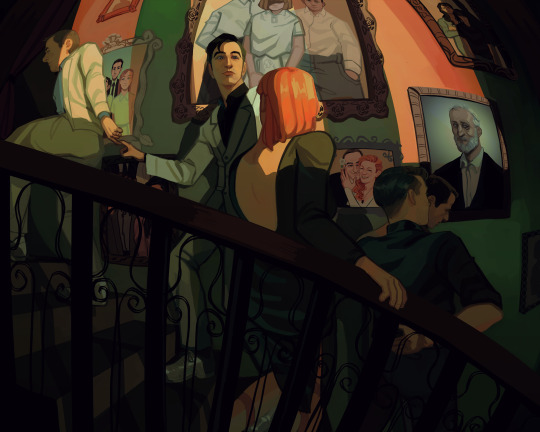
One wedding and three funerals
Background paintings under the cut
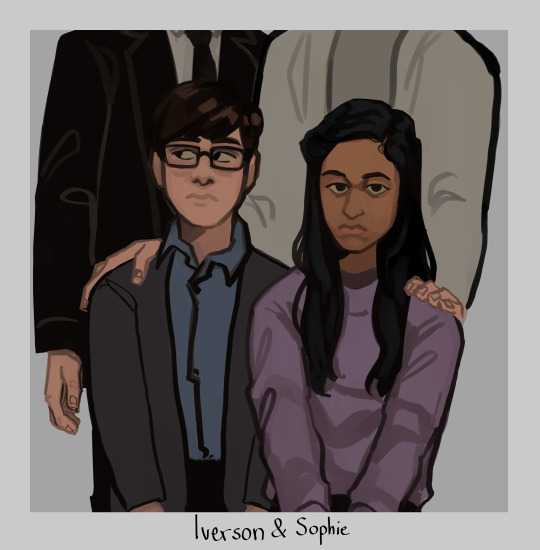
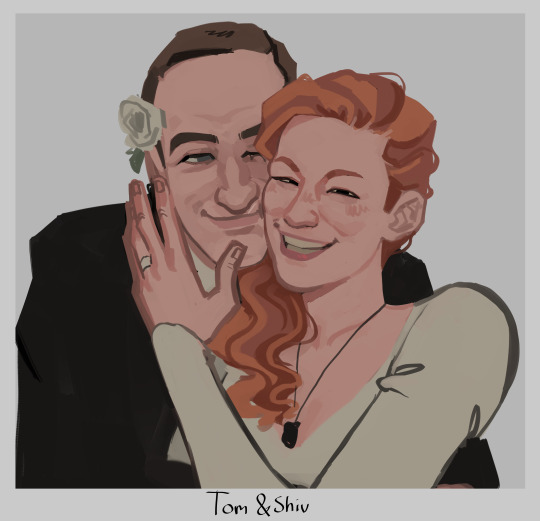
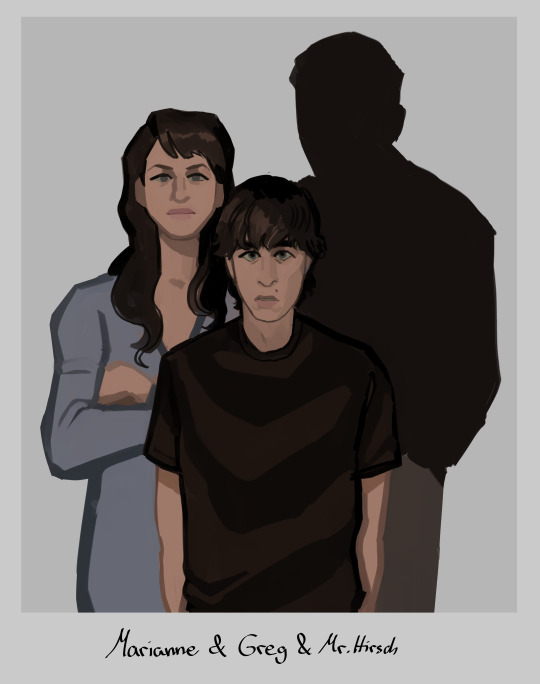
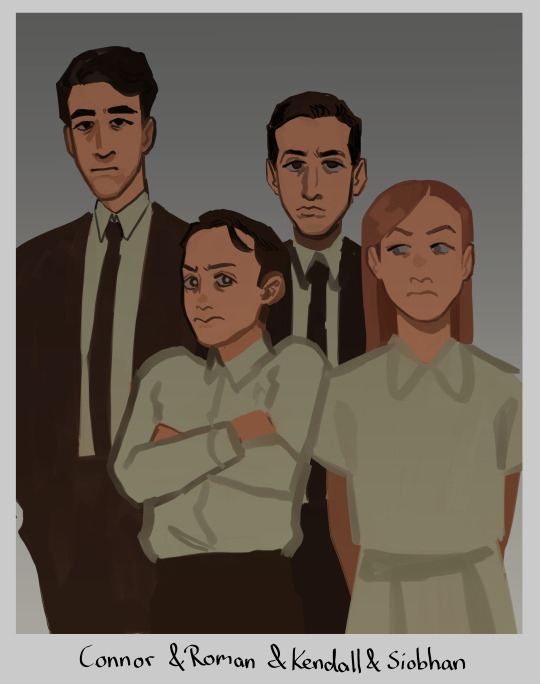
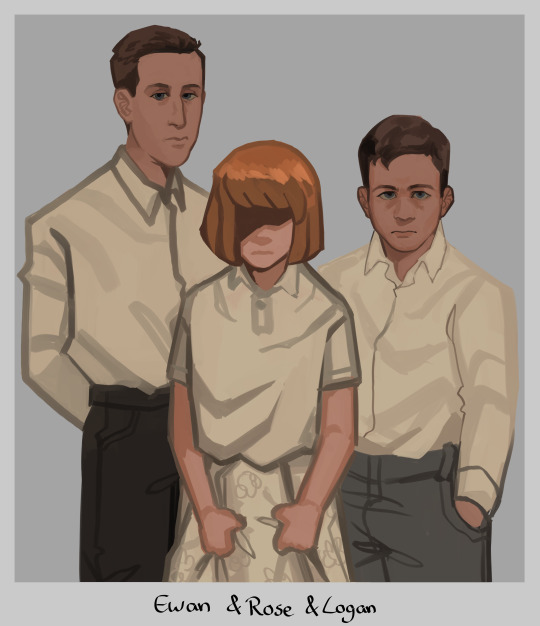
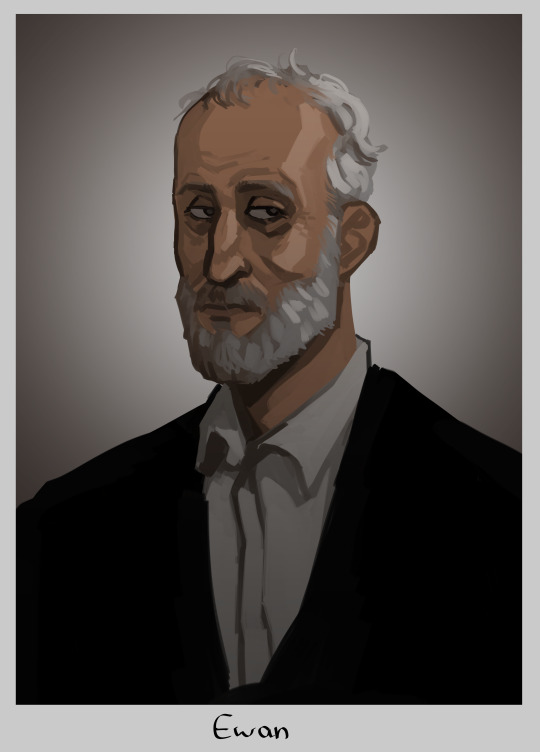
#tomgreg#succession#tom wambsgans#greg hirsch#shiv roy#roman roy#kendall roy#yeah no im not tagging everyone thats too much#this is me going 'how much implications themes and symbolism can i fit in one painting'#yes i gave rose shivs haircolor. if we ever find out how she looks like and its not like this im just gonna pass away i guess#but yeah i hope yall connect the dots#i put waaay too much thought and work into this. i was googling pictures of all the actors as kids just for reference (sigh)#honestly kinda wanted to make tom and greg link pinkies as like. a pinkie promise. but that was too hard to draw in this angle#at least not without obstructing the view of the ring which is important to see so ya#my fave is actually the tomshiv wedding pic i went off with that. i love them... they should have run away to become sheep farmers fr fr#anyway im so glad im done with this UGH!! finally i can draw smth else without being like oh noooo i need to finish this#i see a lot of you wondering why there is no portrait of logan but one of ewan#it's bc the placement of the painting represent their standing. logans portray would not hang next to the stairs#his present portrait hangs at the end of it. all the way up at the top. alone and withering away#basically the picture you see underneath ewan to the right? its where toms parents would be. the right side of the wall is tom and gregs#and the left one is the roy siblings theirs. since they grew up rich rich. and tom and greg didn't#but ya thats why ewan hangs here and logan does not :)
14K notes
·
View notes
Text
Love in Chaos


The way chapter 393 seized me from the inside out, brought me to my knees, smiling with fierce glee—it was all the proof I needed. All at once, a checklist I didn’t even know I was keeping started getting all its boxes ticked. I’ll admit that for some time, I haven’t been sure exactly how Toga’s story should be handled for her to get the care, nuance, and dignity she deserves. So I’ve been resigned, waiting to see what Horikoshi has to say about it. I didn’t know until I saw it, but I can tell we’re on exactly the same page.
This fight between Ochako and Toga—or should I say Himiko, since ya know, they’re both on a first name basis now—it’s a kind of breaking point for the overarching narrative and its themes. Here is where the big questions about hero/villain society are not only asked, but answered. Himiko, more than any of the other main villains, was branded with that label as far back as she can remember, without her having done anything except exist. Thus, she carries the weight of their society’s problems and becomes a symbol of the injustice in prejudice and fear, the brutal agony of being rejected by the world. I’ve maintained this resolve about the story for a long time: I will not be satisfied with an ending that constitutes a return to normal, or even a slightly amended normal. I know that it would be a disservice to Himiko if she were made to fit into society again, whether that be in death or reform or containment. Society has to change for her. After 393, I can tell that Horikoshi knows this too.
It’s the way Ochako steps up to this conversation so boldly and positions herself on Himiko’s side. When Himiko dismisses her words as fickle, claims she’ll go back on them and do horrible things to punish her according to hero society, Ochako comes right back and says no, this isn’t about what you’ve done, this is about you. I see you. I see your beautiful smile and I want to protect it.
Throughout her life, Himiko has not been treated like a real person, so of course this is what she needs. No lecture on morals could disarm her the way acceptance can. It’s also extremely refreshing and reassuring to see Himiko being taken seriously. I’m so incredibly excited for Ochako to accomplish such a completely transgressive act of unconditional love against this harsh world. I could stare in awe of the panels in this chapter for hours, how they’re drawn at the exact intersection of beauty, pain, and honesty. Grotesque violence and elegance. Power and vulnerability. I was so overcome that, for a while, I failed to register a crucial implication.
Enter: The Female Vampire Carmilla
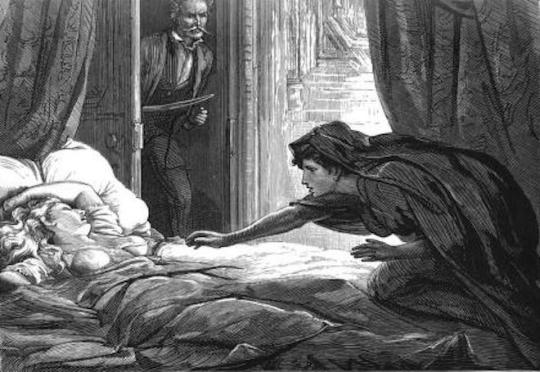
She is referenced merely in passing, but as a rejected villain name for Himiko, speaks volumes. It’s difficult for me to find the words to summarize… perhaps you’ve heard by now that Carmilla is a gothic horror novella about a lesbian vampire. THE lesbian vampire, in fact—the one who popularized the trope. Knowing this, it is simple enough to apply the story of Laura and Carmilla in parallel to Ochako and Himiko, and register it as direct proof of the dynamic’s sapphic undertones being acknowledged and intentional. I mean. Look at them.

Yeah. But that’s not all. That isn’t what really makes it noteworthy. Put in context: Himiko has been called a soulless inhuman vampire since childhood, and shunned for it. To her, this or any villain name would be a reminder of her lack of agency in identity. Add to this the overall themes of 393 I just described, and suddenly it becomes clear that Himiko is set in contrast against much of what Carmilla, as a fearful narrative about the supernatural, represents.
But I’m getting ahead of myself. Let me provide some details about Carmilla for those who aren’t familiar. The story was written in 1872 by Sheridan Le Fanu, and belongs to a genre characterized by a revival of Gothic aesthetics in service of providing mystery, intrigue, and suspense to a very Victorian expression of fear. On top of that, Carmilla directly influenced Bram Stoker’s Dracula, and set the precedent for many vampire portrayals to come. Many female vampire characters reference her at least in their name, and the novella has been adapted and reinterpreted countless times. Because of this, it is admittedly difficult to be sure of Horikoshi’s familiarity with the original, or pinpoint any other potential influence he may have picked up from another adaptation. One could quite literally write a whole book about the many iterations and widespread impact of Carmilla. This is why, however, I believe I can confidently say that Himiko being compared to a female vampire has implications that are felt no matter one’s familiarity with the origin of the trope. Certain things are baked into the definition through generations of media. The female (lesbian) vampire implies predation, deception, lust, a danger to innocent young women. She represents an inhuman desire that must be vanquished.
In the novella, the main character Laura becomes a fast, intimate friend to Carmilla, a strikingly beautiful and captivating young lady who has suddenly appeared in her life. Laura admires and loves Carmilla dearly, but feels conflicted in moments where Carmilla is overcome by a desire that is explicitly compared to that of a lover. She talks of blood, death, sacrifice, and unity all while holding her close and kissing her. Whether or not this is hot, or whether Laura reciprocates any desire is, I guess, up to interpretation. But one thing is for sure: the ending of the story is not in Carmilla’s favor. I’d argue it’s not in Laura’s favor either. Look, I was an English major. I’m very familiar with discussions along the lines of “is ___ gay?” and “is ___ a sympathetic portrayal of ___ ?” It’s definitely gay, but the rest is unclear. There might be a tangent to go on about how Le Fanu’s complicated relationship with religion may have informed his characterization of General Spielsdorf and the other men who hunted down Carmilla’s grave and destroyed her. Regardless, there is narrative injustice in the way Laura is removed from these events, sent home and only told about what happened later. She loses agency. Her narrations become distant and clinical. In the very end, she describes being plagued by visions of Carmilla, sometimes as her beloved companion, and sometimes as a fearful monster. To me, this represents the lack of closure she has, either to reconcile these two sides of her, or mourn her loss.
There is also so much we’ll never know about Carmilla herself. The finality of her condemnation silences the multifaceted character that was only partially revealed to us. There is an inferred humanity to her, a self-awareness, a true romanticism, that gets dismissed by the people’s understanding of what a vampire is: a deception.
Keep in mind this tragedy. Fast forward through countless vampire portrayals to the present, to Himiko. What a contrast indeed. Remember, she does not want to be called “Carmilla,” or “Vampire.” To make such a reference in a chapter that is showcasing Ochako’s acceptance of Himiko implies that the trope is being broken. It is as if Laura were to go running to Carmilla’s grave herself, throw her own body over her in protection, and shun everyone else’s superstition and desire for vengeance.
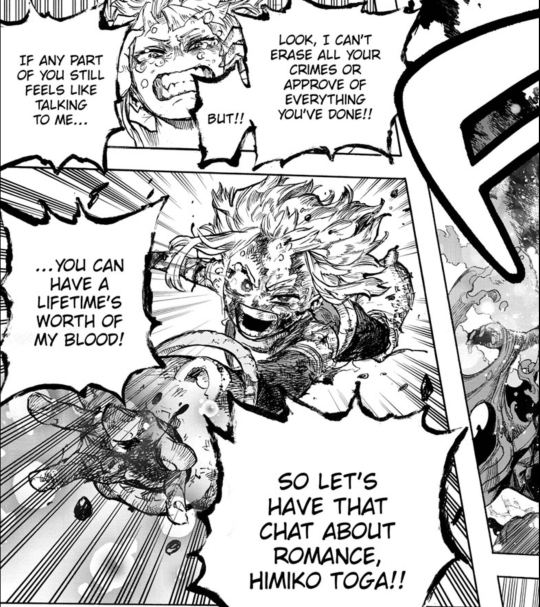
(footnote: the above is supposed to say “Himiko-chan” but you know who is a buttface)
Here’s the kicker: since female vampires are so closely tied to negative and predatory portrayals of lesbians, this humanization of Himiko also suggests that her queerness will likewise be treated openly and sympathetically, because there no longer exists an allegory that could be used for dismissing it. Ochako has already made monumental assertions in this chapter. By saying she admires her openness and envies her beautiful smile, and by presenting complete vulnerability in offering her blood, she swiftly separates herself from the lifetime of persecution Himiko has dealt with. It all represents so much more than those who mistakenly call it “yuri pandering” could hope to understand. This is the real deal.
So what is this talk about romance they’re supposed to have? I firmly believe whatever Ochako says, it has to be a very surprising revelation, for both Himiko as well as us, the audience. Otherwise all the hype and mystery makes no sense. If Ochako has something so important to say, it can’t be to confirm Himiko’s assumptions. Whenever I try to dissect the exact possibilities, I get hopelessly tangled up in semantics, but ultimately I just hope to get Ochako’s perspective in full, especially as it relates to what other people think of her.
Actually, I had an idea while writing this. I saw someone on twitter (I think jokingly) bring up the All Might doll, like oh god, what if it comes up again. Ok but listen. There’s a LOT of potential symbolism in the token from Izuku that Ochako has kept being a doll of All Might specifically. We all know it calls to mind Izuku’s emulation of All Might, which resulted in the aspects of Izuku that Ochako herself admired. We can also easily infer that during the mission to rescue Izuku, Ochako saw the darker side of these traits. Okay, so here’s another wrinkle: All Might, as a near mythical figure, represents hero society. He’s the hero archetype, an upholder of the status quo, “peace,” and his weakening under all the pressure implies a flawed system.
Nighteye predicted All Might’s death, but also admitted that a strong enough collective will can change the course of his predictions. Ochako sites Nighteye’s own death as an origin for her beginning to question who exactly in this world needs saving. If you know my meta, you know that I believe All Might needs to die in symbol only. Right now, Ochako is throwing out an awful lot of things heroes take for granted. Things everyone takes for granted. The outcome of this fight could be a turning point in the war that completely changes the tone. If Ochako is to accomplish this by way of an intimate talk of romance, well…

Bye-bye, All Might!
#for the record I love toshinori so much#bnha 393#bnha manga#mha#toga himiko#uraraka ochako#togachako#meta#lin speaks#boku no hero academia#my hero academia
276 notes
·
View notes
Text
gosh I'm normally not one to write to music (or get inspiration from music for my WIPs) but Never Let Me Go (Florence + the Machine) has done something to my brain.
So I have like 16+ WIPs and, of course, some are higher priority than others. And I have this one WIP (placeholder name: WIPX) which is really low down on the priority list. It was basically just a sort of whumpy idea I daydreamed about once and thought might be fun to revisit one day. But I wasn't particularly attached to any of the characters/worldbuilding yet and the plot was pretty simple and underdeveloped. I still fully expect this story to be a short standalone.
But GOD does Never Let Me Go fit the vibes so fucking well. Religious symbolism, ocean imagery, ANGST. I'm mad it was not intended to be about mermaids because damn. It feels like it is about mermaids and temptation and drowning in bliss and being lured to your doom by your heart's darkest desires. aka mermaids.
And it's like the themes of this song (at least as I interpret them) are the missing puzzle piece of WIPX for me. Suddenly I have direction. I have ideas about how to tie all the threads I have set up into something that can build into a "single final confrontation". I am unequivocally certain of the imagery and vibes and themes and mood, of the "type of story" I want to tell.
And I didn't originally have any religious imagery in the WIP, although I did start flirting with the idea before I realized how apt a song Never Let Me Go is for this project. But damn, opening the story with a scene that takes place in a Catholic-inspired cathedral dripping with images of hellish mermaids reaching with long-nailed fingers toward the worshippers in the pews, as though to drag them from beneath the heavenly light of the stained glass windows into shadow. It just gives this WIP about a bunch of nepo babies who rescue a mermaid from a lab and end up on the run from their overcontrolling parents who are convinced the mermaid must have them in some sort of thrall, so much more depth.
Still trying to figure out what exactly it is implying, but there is a nice contrast that is tying into things that already exist in the WIP and it feels very rich for it.
Suddenly this WIP got bumped wayyy up the priority list.
Once I figure out the implications I shall be unstoppable. mwah hahaha
#watch me immediately get stuck again after this breakthrough#wipx#why is it always my wips that don't have names that I end up writing first?#I promise some of my wips do have actual names
5 notes
·
View notes
Note
did you ever make that loona lore master post or google doc? it's been so long, icr what it was supposed to be. if not, can you explain the imperialist blah blah blah? does it have to do with yyxy being trapped in the garden? is it like assimilation? also sorry this is already so many questions, but one more: do you ever get mixed feelings about the lore because of the man who created it? i enjoy thinking about it sometimes, it's the reason i paid attention to loona in the first place, but i don't think much about it anymore. not just because it's become stagnant, but truly the girls >>>> the lore and its creator. and BBC. anyway, thank you for your knowledge <3
Mm like I said a while ago, I still haven't made the Loonaverse 101 engagement deck (although I'm very slowly working on it) but in the meantime I do have a masterlist of posts that I've made on it here.
I'll discuss the theme of imperialism below (1.3k)
We see it in all three units in different ways. 1/3 has the aestheticisation of Europe and the issue of Hong Kong. (Ordinarily I'd hate to bring up politics about Vivi's home country but please take this part as dissociated from her and her identity outside of her character; the narrative is inherently political so it would be remiss of me to not mention it when it was definitely the intention.) OEC has specifically Americanisation, and yyxy suffers the effect Christian colonialism.
With the knowledge that the ex-director picked the loona members primarily on how well they served his narrative, it's absolutely intentional that Hong Kong, an ex-colony of the British Empire, until 1997, is featured as key location in the lore; where Vivi meets and frees Jinsoul; where 1/3 go to school, and where they cast the Sonatine spell to locate and save Yeojin. Another key location in the 1/3 arc is the Czech Republic, who is also a state that gained freedom from a communist state (Czechoslovakia) in 1993. This is reinforced with Yeojin's location being Taiwan and not mainland China, and Taiwan becoming democratised in 1996. Notably, all of these states became independent democracies in the 90s, when Vivi's story is set. Interestingly, despite these countries being non-communist when the story is set, and in present day, red stars are included in the Love&Live photobook, as well as a photo of Mao, which feels too strange to accidentally slip in considering how controversial it is.
Heejin and Hyunjin's respective locations are also known for their imperialistic efforts; France colonizing large swathes of Africa and Japan colonizing the vast majority of the Pacific sphere, and both committing horrific human rights violations and war crimes to do so. With regards to Haseul, Iceland doesn't really fit the pattern (I almost consider it a neutral zone? After all it's also associated with Gowon and Olivia Hye, and maybe even Chuu), but if you take The Carol being set in London, it integrates perfectly, with the British Empire joining the other two empires. I think the statement being made by picking these locations is to use 1/3 as a vessel to comment on colonialism (though I feel like nobody has really noticed???) Heejin specifically is shown to be adorned in white and crucifixes all the freaking time.
I think Vivi's character, being an Asian female robot, links a lot to the objectification and dehumanisation inherent to describing the Asian (typically Chinese) work ethic as robotic, lacking autonomy or the capability to think for themselves, and unempathetic. This has been talked about by other people and called roboticism, and is often rooted in sinophobia, but more broadly impacts East Asians on the whole. I think, whilst considering Asian fetishism and how Asian women are statistically considered to be more submissive/servile/docile, and that a robot is also meant to be a servant, there's some uncomfortable implications with that too being that are raised by the narrative. I've talked before about how Vivi is a symbol of 'the other' as a queer robot foreigner, but all these aspects are kind of linked - there is no coincidence the foreign member is also the robot. However, we see that despite Vivi feeling that sentiment of otherisation by existing differently to the other girls; "Why doesn't my heart beat fast too?" (x), our girls never ostracise her, and love Vivi not in spite of but because of her differences - which is central to one of the core messages, that outsiders are unconditionally loved by LOONA.
Odd Eye Circle has superpowers. Two of them are blonde. Their arc is set in Los Angeles. The narrative ties the philosophical idea of the Ubermensch (from Nietzsche) with the classically American genre of Superhero fiction. It's become a hot topic this year (despite pretty much always being true, and definitely at least true in 2017) that American superhero films serve as propaganda for the American military, a known force of imperialism, with Marvel directly working with the Pentagon with its adaptations of comics to films. The idea of the Ubermensch has been famously twisted from its original intentions to promote eugenics and the notion of a master race (I think this bastardisation is also relevant!), but originally was meant to convey the idea of a human who could transcend society to live according to their own, new values, working to save or better humanity, and leave a permanent impact on history. This is evocative of how the OEC members seem to quit school to serve their mission of... doing whatever the hell they did in Girl Front with their superpowers to, presumably, have some impact on humanity, or LOONAs around the world as a whole. The ubermensch is also tied in with the Death of God, that with the existence of humans so above it all (or more broadly, with how far society has progressed without God) there is no need for God anymore, thus He is dead. 'DEAD ARE ALL THE GODS: NOW DO WE DESIRE THE UBERMENSCH TO LIVE.' Perhaps the OEC members are not the only Ubermensch; perhaps all LOONAs around the world get to be Ubermensch.
I think this other quote from Thus spoke Zarathustra is pretty pertinent to the LOONAverse as a whole;
"But when Zarathustra was alone, he spoke thus to his heart: "Could it be possible! This old saint has not heard in his forest that God is dead!"
Which is evocative of Yeojin and the 1/3 girls being lost in the (very ambiguous) forest, and also being the ones most heavily associated with Europe.
This unit is significantly more sexualised compared to the pure and virginial vibes from LOONA 1/3, reflecting the attitude that American culture is oversexed (though really sexual objectification is of course a problem internationally) which can be seen with the portrayal of Korean-Americans in Korean media (in this SNL clip where the trope is played for laughs - fun fact, this clip gets referenced in Why Not! It's all connected!!!), and more broadly Americans (with Black American characters often being victimised significantly more in these portrayals) in anime - Nikumi from Foodwars is an example, though there are many many more. OEC is a vessel for the ex-director to comment on American society.
yyxy represent the impact of the Catholic Church in Korea, both obviously a vessel for Catholic Colonialism and also a symbol of democracy and anti-fascism. Whilst Korean Catholicism (as well as other denominations) has its origins in the ~17th century, it only saw a big boom in membership after it was freed from Japanese occupation in 1945 by the (obviously Western) allies. There is a LONG history of Korean Christianity which cannot be dissociated from its use as a tool of rebellion from, and coping with Japanese imperialism, nor can its role in the fight for democracy during authoritarian dictatorships in the 20th century be understated, but I think within the context of the story it is meant to be considered in a different light, one that ties more closely into how Roman Catholicism is abused to facilitate queerphobia and other conservative, reactionary attitudes, which is why yyxy choose to leave Eden and disobey God, and religion is portrayed as controlling and abusive within the story. You mention assimilation, and I think it's interesting that the ex-director takes an English name, and has also given them to multiple characters; Vivi, Yves and Olivia Hye (though Yves is technically a French name). This also reminds me of how Japan, during its occupation of Korea, would force Korean people to use Japanese names, and this is a dehumanizing tool used broadly by many colonists. Edit; also that immigrants often adopt names for assimilation purposes, and aren't necessarily forced to change their names.
Just a lot of elements to consider when thinking about what is actually being said with LOONAverses' narrative - the message is far more important than the story.
#i know @vivifromloona has thoughts about this cuz you sent me an ask forever ago i never answered :P#ugh this is really messily written i ran out of adderall#also cmiiw#this isn't really me coming to any conclusions based on it just more like... summarising where it crops up#do i get mixed feelings? mmm.... yes and no#i get more mad that i like the narrative's message so much and that its from such a scumbag moreso than i like the lore#loonaverse#loona lore
110 notes
·
View notes
Note
Any theories for Gilbert route?
Like how it will start? How will the slow burn love going? And just how mc will fall for him? Ecc.
Hmm. I don't know much about the man honestly outside of that one event I read (actually I picked up the epilogue and haven't even gotten a chance to read it yet LOL). I'm having a hard time imagining how it will go, but I get the impression it will touch on a few things:
Obviously the elephant in the room, the fact that he's from Obsidian, is a huge stumbling block right off the bat. His mere presence being tolerated in the palace is enough to have people spreading angry rumors that the Rhodolite royalty has betrayed them - everywhere he goes he's viewed with hatred and mistrust.
The degree of culpability and responsibility he bears for the actions of those who've come before him. As he said, he wasn't involved with the invasion of Rhodolite but the specter of it hovers over him wherever he goes. People rarely see him for him, I would imagine. He's a figurehead, a symbol, and people make of him what they will for their own purposes - whether that be good or ill.
In a passing comment in Rio's route (because it's the only one I've seen him in, maybe he repeats this sentiment elsewhere) and elsewhere he gives the implication that he seeks to do away with royalty or the concept of aristocracy. He clearly holds a good deal of it in contempt and disdain. This would also fit the theme of every other Cybrd Act 2 Big Bad being the anarchist, the one who wants to shake up the system. Gilbert gives off stroooong Kicho 2.0 vibes to me.
Emma spends every moment I have ever seen her around him absolutely terrified and/or on edge. It's hard to picture that blossoming into any sort of romance, but I am sure she will make her bold declarations to see him for him, charm him with her objective nature and empathy, and come to lose her fear of him when she realizes he's not the Real Enemy (whatever that ends up being - his family or The System or Corruption or what have you).
I'm not sure how an actual route will go. Gilbert seems keen on getting her exposed as Belle, not as a matter of proving it to himself since he knows she is already. There will be manipulation atop manipulation and plenty of cat & mouse, as he tries to back her into a metaphorical corner. I have to wonder if he believes he can find some use for her in his plan to shake up the system? is there specific wording in the Covenant that would allow her to appoint a prince that's NOT from Rhodolite as king, some loophole? Would Gilbert find some way to use that to his advantage? IDK all I have is speculation!
#mrs o talks#ikemen prince#ikepri#ikepri gilbert#spoiler#spoilers#ikemen prince spoilers#ikepri spoilers#this is just me throwing darts at a board but ah well
49 notes
·
View notes
Text
Romance in MXTX, Priest, and SHL
MXTX: Flower, Wine and Dreamworld
The romance in MXTX's works is like flower that grows in ice and snow; colorful, bright and hopelessly romantic, blossoms in misery and hardships.
It features a distinct "us against the world" mindset, depicting love as the only constant in the world. It's an eternal "dreamworld" detached from worldly matters, the perfect escapism as well as a source of strengths in the face of cruel reality.
Both MDZS and TGCF are a critique of mob mentality.
The contrast between CQL and MDZS is very interesting. While the former ends with LWJ taking charge, and therefore changing the world for the better, the novel ends with wangxian isolating themselves from grand politics and focusing more on helping individuals as recluse. It has an essentially pessimistic attitude towards the morality & intelligence of the collective.
TGCF takes a slightly more optimistic approach, featuring the crowd being courageous under the right circumstances. However, both works share a similar undertone: putting one’s absolute faith in the collective is dangerous, whereas unconditional trust and devotion can be only found in one-to-one connection
MXTX herself compares MDZS and TGCF to 花间一壶酒 (A cup of wine among flowers), MDZS being the wine and TGCF being flower. She also compares MDZS to 风雪夜归人, the person returning home from snow and wind, and TGCF to 红泥小火炉, a small red furnace.
Priest: Breezing Wind and Burning Iron
The romance in priest's works is more complicated. It's the most gentle in its normal state, when it is rational and collected, in which case it's like the breezing wind, soothing, sweet and light-hearted. It gives the individuals more incentive to achieve their individual and/or societal vision, as well as more reason to value their own lives & well-being.
In Faraway Wanderers, the most distinct feature of WenZhou relationship is how in naturally sync they are, and how comfortable & smooth their dynamic is. They both have past burden, but it doesn’t matter, because they bring simple joy, understanding and happiness in each other’s lives.
In Sha Po Lang and The Guardian, the ML’s lingering love for the MC motivates them to become better version of themselves, to care about others, and to form a holistic vision about bettering society.
In The Defective, Lin Jingheng(MC) explicitly said that Lu Bixing(ML) is the only meaning in his life. He had little incentive to care about his own life after his revenge plan fell apart. LBX helped him reconnect with his inner idealism, and gave him a reason value his life.
When the passion and fiery energy manifests itself, however, the romance is like burning iron, blood and fire. It isn’t actually toxic or unhealthy, but it's not pure and innocent either; in this case, it strives for something deeper and more intense, never content with the past or the present. The sheer intensity of relationship is like a double-edged sword, walking the fine line between unconditional devotion and dangerous obsession.
SHL: Spring Water and Healing Open Wounds
The romance in SHL is like "spring water"; it's warm, gentle, nurturing. It breaks through the boundary between individuals to bring the couple closer to each other, taking them back to a utopia of their childhood dream, away from social pressure and responsibility. The theme central to their relationship is “salvation”: how love is able to bring people back to integrity.
Both drama wkx and drama zzs have lots of regret about their past sins and wrongdoings. Four Seasons Manor is essentially a metaphor for purity, acceptance and the safety of childhood home. How to make drama wkx open up and accept this safe harbor as his home is one of the most significant plot-lines of the show.
SHL couple is way more emotionally vulnerable and expressive. A significant part of SHL arc is healing the wounds in an open and honest way. They cuddle and confide in each other way more often, talk about their shameful past and even cry about their regrets in front of one another, which is very rare among MXTX/Priest works.
The heat of the relationship sometimes gets too hot and even burns; in other words, there are constant miscommunications, conflicts and misunderstandings in the relationship. However, they can never let each other go, because it's the only source of warmth left for them in their hopeless lives filled with regrets and guilt.
Similarities and Differences
*Note that this is not a SHL/TYK comparison. TYK is kind of an “unorthodox” priest novel; you will know what I mean if you have read 3+ of her works.
Relationship Dynamic & Narrative:
In MXTX’s works, the concept of “romance” itself is divined; and the characters are illustration of the ideal of “undying love”. People are made for one another, to complete one another. Her works use colorful symbolism (silver butterflies, the emperor’s smile, the 3 thousand lanterns, etc.) to depict this romanticized ideal of love.
For MXTX, the romanticization of “destined love” is one of the most recurring themes of her novels. Therefore, the readers look at their relationship through rose-color glasses. Obsession is usually framed in a jolly & romantic light, and doesn’t feature much tension or stress, and has less negative or unhealthy undertone.
In most of priest’s works and SHL, soulmates are not born but made, so they have to figure out how their relationship works step by step. Therefore the narrative is less of a “rosy picture”.
Priest has a habit of using derogatory terms to describe relationships that are mostly healthy, but somewhat “bloody” and edgy, full of excessive passion and obsession. The most common phrase is “爱生忧怖”, a Buddhist term meaning “love results in worry and fear”.
SHL obviously has to be more subtle in expressing love. That said, drama WenZhou are way more emotionally vulnerable and expressive than their novel counterparts, as well as most Priest & MXTX characters. They have a dramatic falling out once in a while, even towards the end. They barely fit the Chinese definition of Zhiji (to know me/to understand one another), but are “lovers” who are buried deep in their passion instead.
Past, Future and Evolvement:
In SHL, characters are encouraged to treasure past impressions that are thrown in figurative “wrappings”, whose luster is derived from age-old experiences (Psychological Types, Carl Jung). In other words, they are encouraged to root their love in a shared past, a Utopia of innocence.
The contrast between The Defective and Word of Honor is very interesting to observe. Both involve long separation, and the suffering and personality changes hat comes from it.
SHL narrative frames their innocent childhood as something to cling to and return to. Drama WKX is encouraged to accept his identity as Four Seasons Manor disciple because it was part of his childhood past. This is a significant part of drama WenZhou relationship.
In The Defective, the narrative doesn't encourage the couple to dwell on the past that much.
On the contrary, the all-knowing AI explicitly discouraged the MC from “comparing past to present”. They are advised to accept changes, however painful it might be, and build a better, more equal dynamic out of it, evolving from one-sided pandering to fighting side-by-side.
In Priest’s novels, the characters rarely return to something in the past, but look into the future. Change is usually framed as inherently beneficial, albeit usually painful and rocky, the implication being that you need to constantly strive for something better.
Sha Po Lang is a good example of this, with Gu Yun’s changing attitude towards Chang Geng after he as he matures, gradually showing his intelligence in politics. CG starts referring to GY as Zixi instead of YiFu is also a sign of this change---to see him as equal rather than a parental figure & protector.
The Defective is even more obvious in this regard, with both parties uncomfortable with the change initially, but gradually adjusting to the changes during their 16-year separation. The ML also stops calling MC by his surname “Lin”, as a sign of viewing him as equal.
In MXTX’s works, change in personality or relationship dynamic is neither framed as painful or good. It just happens. It’s a natural flow that take place when it does. Their relationships are rarely challenged by change. They are objectively at a better place compared to their past, but it’s merely the result of a series of events rather than a deliberate choice or struggle.
WangXian’s relationship naturally changes over time after WWX’s rebirth, but neither of them really struggles with the change.
Xie Lian doesn’t even recognize Hua Cheng as the someone from his past, so they start out as friends getting to know each other.
Salvation and Changing one another:
Priest herself stated in an interview that she doesn’t believe in the concept of salvation, since people have the inner capacity to be their own savior. Therefore, priest characters usually don’t actively try to change their partner’s morals or personality. Some might be willingly influenced by their partner, but there’s rarely an element of moral condemnation. Even when there is a conflict between different values, the options are 1) to reconcile them by choosing the middle ground 2) to maintain their independence and tackle it with nuance 3) to break up.
On surface level, Mo Du/Silent Reading is about Luo Wenzhou being Fei Du’s salvation. However, as LWZ pointed out himself, Fei Du would’ve been a good person at heart with or without his influence.
In The Defective, when Lu Bixing mistakenly thought Lin Jingheng stayed in the Eighth Galaxy against his own wishes because of their relationship, and that their priorities are irreconcilable, he even thought about breaking up. Of course he was not serious about it, but this showcased that he would never try to change LJH’s convictions.
In SHL, however, the concept of salvation is central to the theme. Some find it strange that SHL make drama zzs the more “moral” one of the two, despite his action being more objectively questionable. In fact, the only reason he get framed as more “moral” is that he admitted his fault sooner, and therefore could guide drama wkx’s path back to salvation: to recognize the goodness in people, make peace with external world, to clear his name in Jianghu, and to follow due process with his revenge plan to avoid collateral damages.
“I tried to change you, but you end up changing me”, said drama ZZS. This relationship dynamic is never present in any of priest’s works I’ve read. Priest characters don’t *try* to change one another.
Does MXTX believe in salvation? Hard to tell. One could argue that Hua Cheng would have be way more amoral and even immoral if it hadn’t been for XL. This is complicated and is a topic for another time.
However, it is certain that MXTX MCs don’t condemn each other morally. “The orthodox one defending their unorthodox partner in front of the world” is a common wuxia trope, but the way MXTX novels approach it is very different from SHL.
HuaLian never had a serious falling out about being on different sides. Even when they disagree, they respect each other and love each other exactly the way they are. Hua Cheng didn’t approve of Xie Lian saving Mu Qing, but he didn’t interfere with Xie Lian’s decision. Xie Lian feels responsible for helping Shi Qingxuan in Blackwater arc, but he is perfectly fine with HC helping He Xuan keep secrets. In several cases where they have different values, they are able to make it work with ease.
LWJ never *morally* condemned WWX for his action, and never once objected to WWX practicing demonic cultivation after his rebirth. In fact, LWJ never objected to WWX’s morals; in their previous life he was worried about his safety, and struggled with what to do about certain situations due to his family background, but difference in morality is not an issue for them.
The “righteous” one does not feel the need to guide their unorthodox partner or to be their salvation with regards to integrity.
*The similarity & differences part is a bit messy and some points are not fleshed-out. Sorry about that.
**I don’t claim to have the right interpretation. The lens by which we see different styles of romance is ultimately subjective.
213 notes
·
View notes
Text
Anne and the Core’s Flowering Flames
After talking the past few weeks with @sonofrose, @thesugarcookieday, and @mira-blue, I wanted to expand upon a recent discovery of mine. For those wanting a TLDR, Anne’s S3 shirt design was explicitly noted by Matt to feature flame/lotus dual symbolism that, unusually, the Core seems to share as well in it’s most distinguishing feature:
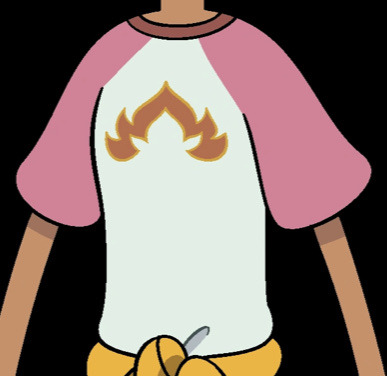

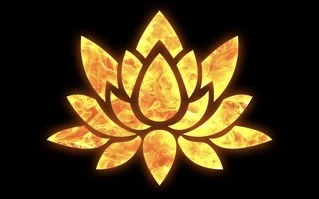
Thanks to @sonofrose for being the one to bring this to my attention, but as it seems, one potential direction for deciphering what this shared symbolism could mean might lie in the general cultural metaphors through which fire and nirvana are linked together in Buddhism:
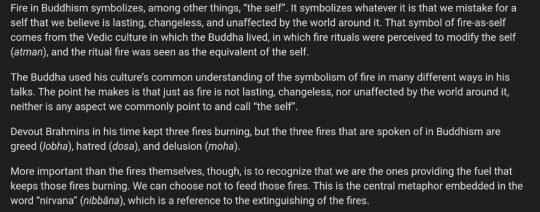
While I doubt Buddhism itself has much direct influence on the show, and I don't want to dive too deeply into a subject I am not familiar with, it has had a major impact on Thailand's history, and the general concept of fire essentially representing the mistaken belief/effort to make one's 'self' "changeless and ever-lasting" seems particularly fitting to me as a possible influence behind the Core's design.
Specifically, in being the biggest antagonist of a show explicitly themed around change, and especially from Andrias' comments pointing towards the Core being intended as a way to cheat death and live forever.
From what I understand about the three fires in Buddhism, they are a metaphor for the fires of suffering in one's life that arise from attachments, and more generally, I want to focus more on the symbolic ideas presented that we are the ones keeping said "fires" burning, and that the metaphorical extinguishing of the fires is tied to nirvana - and by extension, spiritual awakening and enlightenment. There's a lot of specific differences and details surrounding these concepts I don't want to clog this post up with, but overall, I have some suspicions on how this may tie into Anne's design and its potential implications for her arc across this coming season half.
First off, to me, Anne's shirt symbol curiously looks more like the outline of a fire/lotus, almost as if something is supposed to fill it in. Because of the oddly shared symbolism between the Core and Anne, it seems to me that the Core is either a second counterpart to Anne in some manner alongside Andrias, and or that the whole Darcy situation may eventually get supplanted by "Danne" - aka some kind of combination between Anne and the Core.
However, unlike whatever turns out to actually the case with Darcy, I feel it would be better fitting if Anne as the "Final Annetagonist" was much, much more firmly in the driver's seat than having her agency forcibly taken away or such, and if it's that she latches onto an emotionally regressive idea or path of stagnation that Sasha and Marcy have to work together to talk her.
Anne has an established tendency to go overboard with taking responsibilities onto herself as well as to go with what she feels is right/basing her self worth on how well she can do something for others like @borkthemork explored in their analysis post on Sprig's Birthday. Taking into account the incredibly emotionally confusing fractures in the girls' relationships as well as the realistic nuances written into the show, Anne could very easily take it onto herself to "fix" the cracks between them, only to be caught off guard by just how hard it actually would be with all of their deep-rooted and recent baggage.
Contrasting Andrias' implicit attitude of avoiding creating attachments and friendships with others to pre-emptively save himself from pain, I could see Anne spiraling into trying to hold desperately onto Sasha and Marcy and take control on where their relationship is headed/to force it backwards to a less broken past state because it'd be so emotionally painful to acknowledge and actually accept that maybe, just maybe, their friendship can't work with the way they all are right now.
Currently, that is.
Overall, rather than some huge fight with the trio on one side and the Core as an external antagonist on the other or Anne being turned evil, I think it would feel more thematically appropriate if the final conflict centers on the three girls' interpersonal issues. Particularly, if Anne's emotional fire gets symbolically ignited and encouraged by the Core into essentially an ugly mix of Sasha and Marcy's old issues.
An amalgamation of Sasha's control freak habits and her old focus on pushing towards making everything the best she thinks it could be, and Marcy's drive to be of use to others out of low self esteem and her insecurities making her feel lost without her friends/efforts to avoid pain, this "Final Annetagonist" would feature Anne's own version of struggling to deal with change in her friendship with the others.
And in the process, it would open the gates for Sasha and Marcy to symbolically face their own issues and overcome them, while at the same time helping Anne with her issues before the fire within her consumes herself as well.
A fire metaphorically related both to potentially the concept of attachments as well as symbolizing Anne's inner emotions, thus bringing us all the way back to the topic of the combined fire/lotus dual symbolism between Anne and the Core. After all, just like how how we are the ones who provide the fuel for the fire in Buddhist thought, Super Anne's design features quite a few tree branches and leaves. Branches and leaves which are also rather flammable and good for building a fire...


Essentially, Anne's most iconic design/her Super Anne form already metaphorically has plenty of fuel for a fire to burn, and all such potential kindling needs is just a spark -not even a full flame at that- to eventually be all set ablaze and turned to dust. Unless, of course, the fire is halted early enough that is.
Thus far, Anne hasn't been framed at all as a desired host by the Core and it'd just be derivative of the current Darcy situation/make the interpersonal conflict a bit less personal between the three girls if she loses her autonomy. But whether she gets somehow infected by a fragment of the Core like the portion in Andrias' crown, absorbs it, or winding up in a negative enough headspace that she might even be manipulated into willingly taking it into herself, her fire/lotus symbol would be completed with the final puzzle piece, and presumably leaning more towards the former flame symbolism than the latter lotus symbolism to represent Anne being turned away from her spiritual awakening and growth at that point in time.

The Core may not directly set Anne on fire, but it could very well essentially hand her a lighter and encourage her to use it - a different kind of toxic internalized influence/ideas/thoughts than the ones Anne had started off the series with. Since then, Anne has learned to do the right thing no matter how much she didn't want to, but this whole situation would certainly put that lesson to the test.
Sasha and Marcy had their own experiences with wanting to go back to the way things were and likely will have their own revelations this season on how unhealthy trying to do so can be, and thus would be able to recognize the same in Anne, challenging her to not do the wrong thing even no matter how much she wants to for the sake of their friendship much like they themselves had.
In that very process of change, Anne could simultaneously quell the metaphorical fire of her emotions, expel a metaphorically and literally internalized toxic influence, and extinguish both her own AND the Core's "fires."
Perhaps the chance may still remain for the flames to rise up once again much like how emotions and habits can be difficult to unlearn and or change, and it'd certainly be painful to let some space between the girls to figure themselves out before they can be in a good enough headspace to try again for a healthy relationship.
But if something like this happens in the show, overall, I see Anne -after a difficult internal and interpersonal struggle- managing to realize her spiritual awakening and fully embracing change, with the lotus the true final dominant symbolism in her life.

#amphibia#amphibia theory#amphibia meta#amphibia speculation#anne boonchuy#sasha waybright#marcy wu#the core#amphibia darcy#amphibia thoughts#final annetagonist theory#corruptianne theory#or should it say#COREuptiANNE theory#;-P
105 notes
·
View notes
Text
‘Teaching Jake about the Camcorder’ Interpretation
In order to understand what’s going on in this short film, I think it’s important to first identify its themes. This theme starts revealing itself early on within the video. In fact, right from the beginning of the second run through we see of the tape.
Before I continue on with my analysis, it’s important to note the way that the story is being communicated. The film is shot as though we are Jake, watching through an old home video of our father. It’s essential to understand that this tape is representing two opposing ideas; subjective memory and objective history. It's fascinating to see these two contrary ideas symbolized by a singular medium, and it's fascinating to note how it was done; the repetition representing objectivity, while the changes in the film representing subjectivity.
From the very beginning of the second runthrough, we see an immediate diversion from the original we just watched. This difference is the father’s facial hair. Within the first playthrough of the tape, the father’s facial hair was limited to a moustache, while in the second runthrough, we notice that this moustache has been exchanged for a beard. It’s a small change, but it’s a change that sets up the theme of the story. By swapping out the father’s moustache for a beard, the film is immediately communicating to us that memory isn’t reliable.
Within this film, there are two character arcs. There is the character arc of the father, and there is the character arc of Jake. Both tackle the same theme.
This theme is the fear of time affecting an individual’s memory. Specifically, the theme is the fear of forgetting and/or being forgotten.
Again, memory is unreliable. It shifts and changes and fades, especially when the memory takes place early in a person’s childhood, and, as evidenced by the father’s surprise upon seeing Jake through the screen, we can assume that the father died early in Jake’s life.
This fear is represented by the character of the shadowed figure; a literal faded, black hole in Jake’s tape/memory.
The character arc of the father is much more active than the character arc of his son’s.
See, the father’s character arc is all about the resignation of being forgotten, while the son’s character arc is coming to terms with forgetting his father.
Again, this theme first shows itself within the second runthrough of the tape. While the father is explaining the rewind button, for the second time, to a young Jake, in the background of the frame we see a figure. This isn’t yet the fully shadowed figure, but instead, it seems to be a sort of inbetween stage. It’s faded and hard to make out, but there is still shadow and highlights, and it still seems to be affected by the environment around it.
This is meant to represent how Jake’s memory of his father is beginning to fade.
When the shadow figure fully realizes itself, and it has its first encounter with the father, the father is terrified. The father is scared of being forgotten, and with good reason. The idea of your child letting you slip from their memory is terrifying. But the father also quickly realizes that Jake continuing on to grip on so tightly to this moment is unhealthy, restricting Jake to reliving the past instead of living his life to its full potential.
Then comes probably what I consider the strangest scene in the film.
When the father stares at the stuffed rabbit, it’s a look of terror. I thought about why this could be, and while the explanation I came up with isn’t based on the most solid ground, I feel the way it fits with the rest of the story is sufficient. In some eastern asian folklore, the rabbit represents longevity due to its connection to the moon, sometimes portrayed as grinding elixirs of life. The fact that it’s a stuffed rabbit could also be relevant, connecting to the idea of the tape recording being a false representation of eternal life.
The fact that the father looks terrified of this stuffed rabbit could indicate, again, his realization that Jake rewatching these tapes over and over and trying to keep this false memory of his father alive isn’t healthy.
I admit, this interpretation is a bit of a stretch, but, again, I believe it fits in with the themes of the film, so it’s definitely a plausible interpretation.
By the end of the film, the father has completely resolved himself to the idea of being forgotten. He gives Jake one final reassurance of his pride, then leaves him. He walks through the door, colored with an orange light. To the left of our old television, we see this same orange light, and in it, the shadow figure.
The implication here is that the father turned into the shadow figure, or, in this case, allowed himself to be forgotten. The father stopped fighting against the flow of memory and time and allowed himself to fade from his son’s memory. And though Jake’s memory is faded and vague of his father, the influence that his father had on him is still very real and sticks with him. This is why the shadow figure reappeared in our immediate vicinity.
In fact, the figure didn’t even seem especially malicious when we saw it flash in the orange. Not to me, at least. Part of this has to do with the lighting shown throughout the film. As it progresses, the film began to get further and further desaturated, the two most colorful versions of the tape being the very first runthrough and the very last runthrough. Everything in between became overlaid with this unsettling, cold blue hue. But at the end, when the father walks through the door, the lighting around him is this warm, inviting orange.
After giving up on fighting so hard to remember the specifics of his father, when both parties give in to the fact that neither can healthily hold on, the memory instead becomes a vague, warm feeling about the idea of his father.
This film is a wonderful introspective about grief and memory, and how aging and time affects them.
463 notes
·
View notes
Note
We obviously don't have any real answers, but for idle speculation: what do you think Crow is on Venus for? I've seen people suggest Vex or Ahamkara reality-warping, but Crow doesn't seem depressed or angry enough for that.
Honestly my biggest question right now. I'll be a little unhinged in this post so bear with me.
Option 1, he wants to be isolated and it's been established that there are no authorised Vanguard operations on Venus so it's the most likely barren but available celestial body in the system. Going beyond the Reef is dangerous and the only thing left in the inner system that isn't yoinked by Darkness or occupied is Venus.
I think this is the most benign and basic explanation that makes the most sense for now until we know more. The rest under the cut:
Option 2, speaking of that same lore I linked, two other people went to Venus for an unknown reason: an unnamed Hunter (with an Eliksni friend) and Shayura. The Hunter was guided by the Eliksni to a part of Venus that didn't belong to the Ishtar Academy:
Hurrying up a shallow set of rubble-strewn steps, a short Eliksni bearing the crest of the House of Light pauses, gazing back at the chrome-armored Guardian moving up the steps behind him. The Eliksni looks the Guardian up and down, then motions to the stark silhouette of a gray concrete-block building rising up from the Venusian overgrowth.
"This ain't the academy proper," the Guardian says on ascent, watching the hazy sky for signs of danger. Moisture clings in glistening beads to his reflective mask; his dark hood shields him from the rest of the elements. "The hell was this place?"
The Eliksni tilts his head to the side, four eyes blinking independently from one another. "Not Human, don't know. But machine inside."
I'd assume that the Eliksni would know if it was a Vex structure, but he only specifies that it isn't human. He mentions "machine inside" which can refer to the Vex taking over, but the structure doesn't seem to be of Vex origin or the Eliksni and the Hunter would be able to recognise that. It's not exactly hard to notice their work.
Shayura came to Venus to find someone. We don't know who. It might be the Hunter in the lore (whom she killed), but it's never specified. The only thing specified is what her Ghost says:
"There are no sanctioned Vanguard operations on Venus at present," the Ghost clarifies, pivoting its cold blue eye up to its Guardian. "Why do you think he's down there?"
There's an implication that whoever she's looking for is known to work or has worked with the Vanguard.
I wonder if Shayura's Wrath lore is chronologically in order or not. Because if not, Crow would fit the description of who she's looking for. Worked with the Vanguard, went to Venus, is easily on Shayura's list of people to kill given his past.
But why would Crow be there in the first place? Maybe it has something to do with the structure described in Shayura's Wrath lore. Crow didn't fully leave the Vanguard, he just got reassigned to work with Lord Saladin in negotiating with Caiatl. Caiatl is hard at work fighting Xivu Arath's forces and the Hive in general. She even implied being willing to nuke the hell out of the Reef to kill Savathun, civilian casualties be damned. Thanks to Zavala, this plan was nipped in the bud.
So my question then would be what is Crow doing on Venus as a part of that assignment? What is on Venus, damn it? Oh, dunno, maybe... Hm.

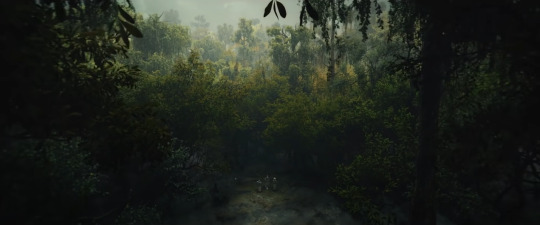
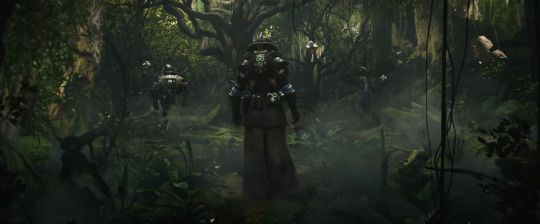
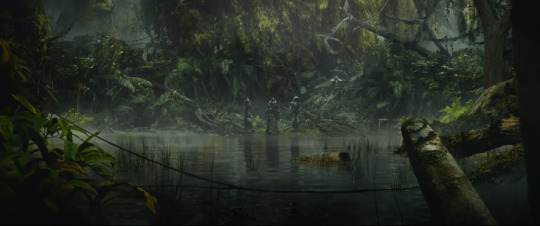
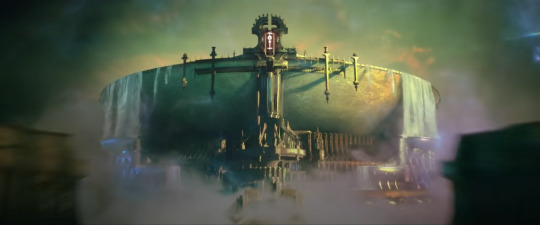
:) ?
Remember, Venus became a jungle world after the Traveler terraformed it. Now, the problem with the Venus look is that the screenshots are only from D1 and those are old. But the jungle, overgrown look with a lot of foliage is there:

A better look might be from concept art:

The question here is: is Savathun's throne world located somewhere in the physical world or is the jungle around it just a part of the throne world itself and the actual location is elsewhere? I lean to the former and if she wanted to hide her throne world entrance somewhere, where better than on an abandoned world of Venus.
Furthermore, Bungie already reworked Venus for Destiny 2, due to Vault of Glass. The textures are there, the loading screen is there, orbit look and music, everything is already transferred to D2. Would be a shame to only have it exist as entry to Vault of Glass. Now, I don't think this necessarily means that the entirety of Venus will be back, but some other smaller part of it, perhaps. There's been a lot of Venus mentions lately, starting from it literally being back as a part of the raid.
For more unhinged hints: Venus is highly sulfuric, something which is mentioned in most lore about Venus, including this week's mention of Crow being there. Witch Queen Warlock armour features many references to sulfur:
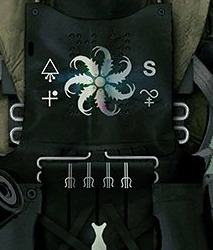
"S" is the symbol for sulfur, 16 is its number in the periodic table and 32.066 is its atomic weight.
Venus is also symbolical for Savathun. Venus is the only planet named after a Goddess and all of its features are named after Goddesses, of which three appear in Destiny: Ishtar Sink, Maat Mons and Pomona Mons. Quite ironically, Maat is an Egyptian Goddess of truth and justice, while Pomona is a Roman Goddess of gardens. Ishtar (Inanna) is more or less the same as Venus mythologically, and both have very close ties to the planet itself as was observed by the ancient people, which is why the planet was named after them.
Best for last: ancient Greeks considered Venus to be two separate celestial objects because of how Venus sometimes appears early in the morning (morning star) and sometimes early in the evening (evening star). They eventually realised that it's the same object, but they continued using two words to describe it: Phosphoros and Hesperos. Its generally mostly used name was Phosphoros which means... Light-bearer. It's also where the name for the element phosphorus came from. Both phosphorus and sulfur are very much tied to alchemy, which is a huge theme for the Witch Queen. Phosphorus also precedes sulfur on the periodic table (with number 15) and was, alongside sulfur, instrumental in the alchemical search for the Philosopher's stone.

^ This symbol from the same Warlock armour refers to the Philosopher's stone: this is a symbol of philosopher's sulfur. Another related symbol also appears on the Warlock armour that relates to sulfur:
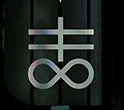
So why is Crow on Venus? Maybe he just wants a place where he can be alone in the world to process what happened. That's fair.
And maybe it's a part of the assignment to find Savathun's throne world because at this point, we all know that to kill a Hive God, they must be killed in their throne world. If the plan is to kill Savathun, and Caiatl is very much into that plan, she is probably looking for the throne world. Crow may be the one to find it. And perhaps someone else has already found it before, if we consider Shayura's Wrath lore.
Okay, I'm done being insane for today.
#destiny 2#destiny 2 spoilers#season of the lost spoilers#crow#venus#savathun#witch queen#lore vibing#long post#ask#i genuinely did not consider venus until this lore today made me go feral from overthinking it#but like. the jungle... fits#and there's no sense in her throne world entrance being on earth because it would've been found earlier#but venus? abandoned and overgrown? yeah.#or maybe i'm just completely off the mark#but weird speculation be upon ye
38 notes
·
View notes
Note
Honestly, I'm completely with you on the whole SentiAdrien thing, but what about SentiGabriel? I've never seen anyone talk about it and I imagine we'd run into a lot of the same issues, but what if Emilie made a mistake that cost her husband's life and because she was already fading, she created a replacement to either revive her or reverse her mistakes? I think it would explain some stuff, but probably also create more questions, like, what about GabeNath? How does it impact their partner-/ P1
P2 relationship? Was Gabriel Agreste really like this or is that Emilie's perception of him or what she wants/needs him to be? How do Felix and his mother and the rings factor into this? It does seem a little weird though to have your main villain basically comatose for most of the show and what amounts to a glorified henchman fill her shoes instead, so this is really more of a sudden thought that hit me after the Adrien flashback in Wishmaker.
There are some issues with the idea of Gabriel being a Sentimonster, mostly having to do with what that would mean for Gabriel's credibility as a villain and, of course, his dynamic with Adrien.
While the idea of a henchman running the show while the evil overlord sits on their laurels or is unavailable is not that uncommon, it's more a fantasy trope than a superhero trope. She-Ra, in its first iteration, had the main villain Hordak serving Horde Prime, who barely showed up in the show. Similarly, the reboot has Hordak tinkering in his lab for over half of the series while his henchwoman Catra fights the heroes as the main villain and he, in fact, never takes over as the main villain. The closest superhero media has gotten to this is probably Darkseid from DC or Apocalypse or Galactus from Marvel, who all often send envoys to fight the heroes, but they are always somehow behind the plan and the henchmen do report directly to them or are preparing for their arrival. Doing a simple villain switcheroo isn't something that would fit the scale of the Agrestes as a threat. All the examples I have given are some kind of evil overlords, godlike beings or both.
It's not just that the trope doesn't fit but there's, of course, some theming issues as well. I have seen a post earlier that criticised the idea of Emilie being evil specifically in relation to a scenario where she's actually even worse than Gabriel, making our main villain literally the lesser of two evils. This would make it so that Gabriel wouldn't really be fully responsible for his villainy, if he was brought onto that path by his wife, and it has some pretty unfortunate implications towards how women are viewed that can be seen even in mythology, like the tale of Adam and Eve. Basically, the implication is that evil, evil women corrupt poor, hard-working men with their seductive feminine viles.
Gabriel being a Sentimonster that Emilie made that was accidentally made evil by her has similar connotations of Gabriel only being evil because of Emilie, meaning that this man's crimes were only caused by his lady love. Women are just fundamentally evil and corrupt the men around them. I doubt a show that tries to be feminist would go that route. Emilie recreating a beast of a husband has less of those implications but it's still kinda iffy. Never mind the Pygmalion associations of Emilie sculpting her husband into existence, even if only as a copy, and a copy with no agency at that.
As a side note, I doubt Amelie or Félix would be aware of it if Gabriel was a Sentimonster or that there's anything up with him regardless. Otherwise they'd try to capitalize on that to get what they want: the rings. However, I doubt the rings would be the Amokized object, since then Gabriel would be more alarmed over losing one and Nathalie would be able to sense the Amok, since I doubt she would be in on it, unless she also used to be Emilie's confidant. Instead, the rings would be symbolic of the pretend marriage bond to Emilie, which explains why Gabriel fiddles with them in order to center himself, with the Amok being somewhere more secure. The other option would be that even he thinks he's the real Gabriel Agreste and doesn't realize that the ring(s) hold his essence. The Gabriel in the show being a Sentimonster would mean that Emilie would want her actual husband, so Nathalie could keep the copy she fell in love with, but any relationship with Sentimonster Gabriel would be iffy in terms of consent because Sentimonsters don’t have agency.
Finally, the show has shown us that Sentimonsters' capability for emotion can vary, most Sentimonsters barely emote, while Sentibug's mood flipped on a dime and came across as more performative than real, and she was the best effort of Nathalie to create a versatile Sentimonster that could pass off as the real thing. We don't know much about Sentimonster behavior since they're often created for a simple, singular purpose, but Astruc has said that all relevant information has already come out, so Sentibug's strange emoting is most likely on purpose and relevant. Her missions was "pass off as the real thing", and even then there was something off about her.
This would serve to excuse Gabriel's inability to form a true parental bond with his son. As a Sentimonster, it is very likely that Gabriel would be incapable of loving his son selflessly and taking care of him properly, either because Sentimonsters truly do feel lesser emotions or because Emilie didn't give him that ability. You could argue that there's some symbolism with adoption with them not really being "blood-related", and that being why Gabriel abuses Adrien, but that's a pretty weird parallel to make, unless the show is actually going to side with the myth that a parent will always love a child of their blood more than an adopted one. I just think that we really don't need more media that vilifies adoption, adoptive parents in particular. In addition, adoptive parents don't have a magical condition that makes them incapable of feeling as deeply as real human beings, so it would be ineffective symbolism as well.
#miraculous ladybug#miraculous tales of ladybug and chat noir#gabriel agreste's a+ parenting#ml meta#ml theory#gabriel agreste#emilie agreste
18 notes
·
View notes
Note
I was wondering what kind of stories would you like to see more of in NA? (I'm not talking about the raunchy porn NA books that dominate the NA market im talking about the actual age demographic for NA😭).
I want to see more like ... more mature protags? Thing is, currently NA is basically just YA with porn, and don't deal with any of the issues of, like, being a young adult (or a "new" adult, as it were).
The thing with YA is that it's usually about, ya know, a teenager figuring out who they are. And that's all well and good for YA, but it just doesn't work as well in NA as a concept, to me. Like, you're still figuring out who you are as a person when you're 18-25, obviously, but the process is different and so are the expectations and so are you. To me, as an adult, it's just not as interesting to read YA anymore because it's usually about ... kids. These books are not for me because these stories are not written for me. And all NA has done so far, as a demographic/genre, is age up the characters a little (or not, if you're yikes) and then made them fuck a lot and say mean words and there's rape and murder everywhere. You don't really get anything actually adult in new adult, aside from what, ironically, teens would consider to be adult. It's the same old "who am I uwu" "you're the elf fae queen king chosen one space ninja 16-year-old" plot that works for a teen but just doesn't hold up for most adults, and aging your elf fae queen king chosen one space ninja to 19 won't do much to change the fundamental coming-of-age story that is usually mainly appealing to people, ya know, coming of age.
And yes I am dunking on SJM and her ilk, because I'm right.
ANYWAY, I want more NA where the protag's struggles actually, like, reflect the struggles of an actual young adult? Like, I want the whimsy and freedom and fun of YA but instead of horny sex shit (which is also fine, don't get me wrong, but that can't be the entire demographic no matter how hard people suck SJM's crusty dick), we actually like, go deeper into the implications of the worlds and into the characters' lives more, in a way that doesn't fit YA but does play on and account for the older reader's capacity for understanding more complex themes.
Like, maybe a fantasy where the protag is like ... a young working class hedge wizard coming in from their little hick town into a big magic college where the people and expectations are entirely different. Maybe it's an urban fantasy story where the protag works as a receptionist or an assistant for a big fancy monster hunting company. Maybe it's a post-apocalyptic story or a dystopia focusing on the life of an underground resistance fighter, who doesn't shoot guns or is the sole symbol of hope for the people, but is like, a medic or a nurse.
To me YA is for teens and a lot of the time, they're about discovering who the protag is, because that's what's going on in the intended reader's life at the time. And I think NA should be about the protag, armed with the previous knowledge of who they are (no matter how shaky), taking that with them and seeing beyond themselves, less about who they are and more about how they fit into the world they live in, struggling to reconcile themselves with the rest of the world. Because that's, presumably, what's going on in the new adult reader's life. The worst of puberty is over, you're probably sure who you are or at least who you want to be, and now you just gotta find your place in the world and how to get there.
Ya know?
I also want more NA stories where the protags actually have this thing that distinguishes an adult from a teen, and that's personal agency. You can get away with a slightly more passive protagonist in YA because they're usually a kid being pushed around by adults (also a must-have for most stories for kids), while NA should IMO have more push and pull and have the protag actively make decisions that have actual impact on themselves and the world and the plot. A lot of current horny NA just ages up the ineffectual girl protags of yore into more fuckable ages but leaves them just as stupid and incompetent as real-life teens (sorry teens, but you'll agree with me in time) and it's just not as fun to read when you're a grown person expecting a level of competence from another grown person. Like are you an adult orrrr what's going on here?
That's just my take though. And I am fully talking out of my ass. But yeah. That's that on that.
Hope it answered your question!
3 notes
·
View notes
Note
What do you feel about amandamaryanna’s video on gossip girl and cosplaying poor? It reminds me of those tik tok videos that are about the most insane rich person behavior you’ve experienced. I feel like it’s subjective because the characters Dan Vanessa and Zoya are basing their poor ness around THEIR environment. So yes, there are MANY people who are actually poor but compared to their UES counterparts they would be considered “poor” due to the fact that they do not have the insane amount of disposable wealth that the other characters have and I do not really see that as them trying to cosplay as poor.
Also what are your thoughts on her argument on GG not really talking about class consciousness and POC issues. Even though the characters Ursula, Jane and Raina had short appearances on the show, as a Black person I think that is was great that they added the few POC characters on GG because their identity was not the main focus of their characters. Usually with Black or POC characters they have to go through some racial turmoil as part of the plot and in GG they got to be rich UES-ers simply because they are. Even though GG is very verryy flawed Penelope, Nelly, Kati, Isabelle and Zoe were shown how POC characters can be rich like the white characters in the show as well GG is obviously a fictional show that’s not based on anything so I don’t think that racial income statistics/racial implications need to be talked about 24/7.
so i started watching this video & just ended up reading the transcript instead. anyway. under a read more:
like, yes. i agree with her on one hand - i think gossip girl 2007 messed up by making dan's grievances be connected to financial status, because the humphreys certainly weren't "poor". like i think this point she says makes sense to an extent:
The comparison between outsiders and insiders and gossip girl is all about relativity. To the average viewer it seems absurd that a character like Dan is supposed to represent the outsider when he is so farther in than any of us could get.
But honestly, something i hate is how people who talk about this show act as if everyone who's watching is expected to know the prices of rent in new york city, etc. like i did NOT realise how expensive that loft is until someone else mentioned it to me and i would not have guessed! who is your "average viewer" - is it an American? someone who lives in New York? someone who lives in Brooklyn? you can't just define an average viewer in that way, i feel! like you are making a BIG Assumption there and it's not necessarily accurate. people who aren't american watch american tv! such is the world we are living in.
but keeping that aside, yeah: dan and jenny had stable and secure housing, the guarantee of meals, and were attending expensive private schools, so i think the show's messaging regarding class was a little strange. they definitely weren't in a financially unstable situation.
but also, you're right. like, dan and jenny weren't super duper broke, and at no point do they actually act like they are, tbh. dan is very 'oh my parents sacrificed so much to send me to st jude's' and jenny is very 'damn i wish i was richer' but there isn't really an instance where the humphreys seem to view themselves as being extremely poor, that i remember at least. in s1, jenny says something along the lines of, "we're humphreys; we're not exactly royalty." and like. she is not wrong! they're financially stable kids, but they're ordinary kids living in an environment where everyone else has the safety net of millionnaire parents to fall back on, and however much money rufus has, he isn't that.
so i think it's a grey area, like, YES, the humphreys have wealth related privilege (i don't know if this can be said for v, because honestly we don't know much about her living situation, but we do know that she works as a waitress for a bit in s1, and also that she's homeschooled, so she isn't shelling out big $$ for school fees.) but also dan and jenny are treated as 'less than' because they are considered nobodies.
and i feel like THAT is the angle the show should have taken. not "i am oppressed because i am not rich" but rather, "everyone at school alienates me and treats me different and it's making things so difficult for me." whenever people say that dan and jenny acted like they were more oppressed than they actually were i'm like. they were both, in different ways, made to feel small and insecure and hopeless, at school? like of COURSE they're gonna feel victimised. dan is treated like he doesn't exist, and jenny is treated so horribly that i don't even have an adjective. like. i think the writing of the show would've been much stronger if it had focused on THAT and not made it a class thing.
i haven't watched the reboot beyond ep02, so i'm not gonna comment on that.
so yeah, i don't think it was 'cosplaying poor' as much as it was 'showing wealth related stuff extremely inaccurately.' like an anon told me, portraying nyu as community college is super inaccurate, as well. and it makes no sense? like i don't know why they had to do this and why they couldn't just... shoot at a regular community college. gossip girl 2007 did not care for representing poor people at all, like, if you watch the show you can tell that it just luxuriates in this aesthetic of like: more food than anybody can eat at every meal. so many luxuries. unnecessarily expensive things everywhere. like the show was very much luxury porn. to me it felt like it wasn't cosplaying poor as much as it was offering people a chance to wank off to the rich. & maybe because of that, the humphreys weren't allowed to be poorer. gg 2007 wasn't supposed to represent all of NY, it was supposed to represent the uber rich elite. and then you have dan and jenny humphrey, and vanessa abrams. they weren't allowed to be rich, because we needed a class conflict. but they weren't allowed to be poor, either, because this show was all about rich people aesthetics. so we got something weird & in the middle instead.
people forget that chuck was canonically a billionnaire - like, that is a LOT of money. and he is dan & jenny's peer! sadly, i think solely because of THAT, a lot of the oppression the humphreys face... checks out. like chuck being shitty to both dan and jenny - he' has an unethical, absurd, uncomparable-to-whatever-the-humphreys-have amount of money. he can do whatever he wants & buy his way out of there. rufus humphrey's ten thousand dollars or whatever amount he mentions are like pocket change to that guy. if jenny is gonna be treated like a commodity by everyone around her, do her upper middle class roots and expensive loft really matter? well, not do they matter as much as like. can they protect her? (we've watched the show. we know the answer is no.)
re: the characters of colour... i think it's subjective. i ADORE raina, and honestly, if we'd had a NJBC that was nate, serena, blair & raina, the show would've actually been AMAZING. like raina was such a cool character to me - i liked that she was driven, passionate, intelligent, sensitive, caring, fun-loving, thoughtful.... she wasn't on the show for long, but her character felt really solid and fleshed out. i remember a review (idk who wrote this one) in which someone felt that raina's character was "lazy" because a lot of her traits and her backstory paralleled chuck, but i strongly disagree. on raina, those traits were interesting. on chuck, any backstory and larger motive felt like a carpet to cover the dust that was his predatory nature, and to me, felt forced and off. like. this dude assaulted people, i don't care about his daddy issues. but raina seemed SO amazing. her backstory actually fit her personality and gave her depth, and to me, didn't feel forced.
i liked ursula, too! she was a really minor character, but she had a whole arc, and i liked that a LOT. her friendship with serena was very cute! i sadly do not remember jane. i think she was... someone's assistant? but i don't remember who. but i agree with you about raina and ursula, their arcs were very interesting and did not end up being about racial trauma & all that, which, like you said, is refreshing when done right.
that said, i think blair's minions were, uh, an example of blair's racism, and i think it would've been cool if the show unpacked that. blair uses her minions as a status symbol - her 17th birthday at kati's place which is anime themed (?) leaves a bad taste in my mouth because it feels very tokenising of a culture that blair isn't a part of? it would be different if blair treated her minions with respect and dignity and like they were her equals and peers, but she doesn't. the word "minions" itself makes me flinch because it's such a "oh you're inferior" kind of word. it felt to me very much like - they never got to be characters in their own right. they solely existed to prop up blair. and i think that is racist. there was a sense of "Oh, I can't be racist! I have a Black friend and an Asian friend" from Blair - like that's what kati & is were to her. and i think that is a big problem, especially glossed over like that.
i also do think that racial stuff doesn't always need to be the focus! but i don't think it can ever be completely ignored, either. an example of something that is maybe unintentionally racist, but racist nonetheless, is how dan cuts vanessa out of his life entirely but forgives his white friends for treating him farrrr worse. it's an inherent double standard, because dan kind of went "oh yeah. my threshold for white people fucking me over is really high, but if my Black best friend who's so close we're practically family does something even slightly wrong i'm going to cut her out of my life 4ever." did the writers realise this? i don't know. maybe they just didn't think about it. but this is exactly the sort of double standards and racist bullshit that woc, especially Black women, have to face irl (though of course i don't need to tell you that at all), except here, the narrative doesn't even address that, hey, maybe dan's being a dick by reacting this way. and i think that's a problem, too.
#long post#meta#racism#anti blair waldorf#(for tags)#anti gossip girl#ok 2 rb i GUESS#and if any poc want to add something more or correct me please do#ditto the class stuff - i am not american#and really just working with context clues
7 notes
·
View notes
Note
Hey! There was a giant lemon cake with phallic image in alayne chapter. Do you think it some coincidence or it means something? Especially it's presented by petyr. Also Sansa and her enemies giving her lemoncakes give same vibes as Hansel&gretel story.
And best of all, Lord Nestor’s cooks prepared a splendid subtlety, a lemon cake in the shape of the Giant’s Lance, twelve feet tall and adorned with an Eyrie made of sugar.
For me, Alayne thought, as they wheeled it out. Sweetrobin loved lemon cakes too, but only after she told him that they were her favorites. The cake had required every lemon in the Vale, but Petyr had promised that he would send to Dorne for more.
—The Winds of Winter - Alayne I
Petyr Baelish is grooming Sansa, that’s the awful truth. And he has studied Sansa, he knows what she likes/wants and he will use that knowledge in his favor.
He knows she had a distant relationship with Ned, so he becomes Alayne’s father.
He knows that Ned neglected her and that she always craved for her father’s validation, so he gives her that, he praised her wits for example, and called her clever and smart.
If Sansa says something like “I can’t” or “I don’t know”, he is there to encourage and support and tell her “you can do it” & “you know it”.
He knows she loves knights and tourneys, so he allows her to organize a tournament, whose winners will belong to a kind of “Kingsguard” for Sweetrobin, based on the child’s favorite hero of the legends: The Winged Knight, Ser Artys Arryn.
He knows she loves lemon cakes, so he gives her a giant lemon cake.
The Tyrells has used the same strategy:
"Sansa," Lady Alerie broke in, "you must be very hungry. Shall we have a bite of boar together, and some lemon cakes?"
"Lemon cakes are my favorite," Sansa admitted.
"So we have been told," declared Lady Olenna, who obviously had no intention of being hushed. "That Varys creature seemed to think we should be grateful for the information. I've never been quite sure what the point of a eunuch is, if truth be told. It seems to me they're only men with the useful bits cut off. Alerie, will you have them bring the food, or do you mean to starve me to death? Here, Sansa, sit here next to me, I'm much less boring than these others. I hope that you're fond of fools."
—A Storm of Swords - Sansa I
We all know how much Sansa loves her lemon cakes, but the Tyrells and Littlefinger really treat her as if she were a child like Sweetrobin:
"Will they be lemon cakes?" Lord Robert loved lemon cakes, perhaps because Alayne did.
"Lemony lemony lemon cakes," she assured him, "and you can have as many as you like."
"A hundred?" he wanted to know. "Could I have a hundred?"
"If it please you." She sat on the bed and smoothed his long, fine hair. He does have pretty hair. Lady Lysa had brushed it herself every night, and cut it when it wanted cutting. After she had fallen Robert had suffered terrible shaking fits whenever anyone came near him with a blade, so Petyr had commanded that his hair be allowed to grow. Alayne wound a lock around her finger, and said, "Now, will you get out of bed and let us dress you?"
"I want a hundred lemon cakes and five tales!"
I'd like to give you a hundred spankings and five slaps. You would not dare behave like this if Petyr were here. The little lord had a good healthy fear of his stepfather. Alayne forced a smile. "As my lord desires. But nothing till you're washed and dressed and on your way. Come, before the morning's gone." She took him firmly by the hand, and drew him out of bed.
—A Feast for Crows - Alayne II
The lemon cake in the shape of the Giant’s Lance
The Giant's Lance is the tallest peak of the Mountains of the Moon within the Vale of Arryn, extending three and a half miles above the the valley below.
The great-grandfather of Petyr Baelish was a Braavosi sellsword that came into the Vale of Arryn at the service of Lord Corbray. His line was continued by his son, who became a hedge knight and took the head of the Titan of Braavos as his sigil.
As I mentioned in this post, a sword, Ice in particular, works as a phallic symbol in Sansa’s chapters.
So, we can also make this association:
The Titan of Braavos = A Giant
The Giant’s Lance = Tallest Peak
Lance & Peak = phallic symbols
Lemon cake in the shape of the Giant’s Lance = I don’t want to write it
We can also say that Petyr Baelish is “compensating” his “shortfalls”, after all he is a short man called Littlefinger.
Yes, I think this giant lemon cake could be seen as a phallic symbol and it makes sense with Littlefinger grooming her... yikes
¡¡¡SOMEONE SAVE HER PLEASE!!!
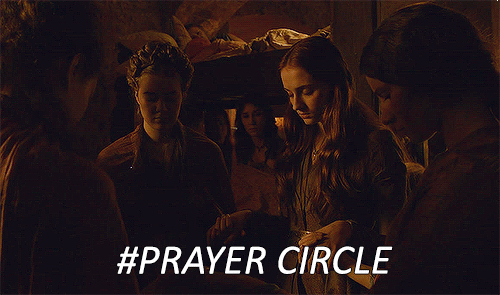
My friend @lostlittlesatellites has already wrote about these subjects, giant lemon cake as phallic symbol and Hansel and Gretel story:
I argued that lemon cakes in Sansa’s arc actually spell people trying to exploit Sansa’s weakness in an almost Hansel & Gretel way and a betrayal that follows.
“Interestingly Sansa’s first chapter in AGOT poses questions that will drive majority of her arc. Her desire for a courtly life in the South will not only prove to be hollow but worse a dream that turns into nightmare. Sansa asks two questions: “What could you want to see? It’s just fields and farms and holdfasts” and “Why would you want to ride a smelly old horse and get all sore and sweaty when you could recline on feather pillows and eat cakes with the queen?”
The world is larger than Sansa has been taught to believe, reclining more inward into her dreams with the strict regime that she taught to look away from the window. She doesn’t think she is prepared enough and that she needs more training. Yes, she doesn’t know enough but neither does Arya or Bran or Jon. Having Sansa finally leave her cage after completing her tutelage under Littlefinger is continuing that student-teacher dynamic she has had since Septa Mordane. People come to love the security of the cage they live in too long. This is why it takes so long to take out the fear of the outside from Sansa because the fact that she has barely any experience keeps her thinking she needs someone to rely on.
[…]
The “Feather pillows and cakes with the queen” part represents the glamour that attracts little boys and girls like Sansa. However, it is hollow as Sansa comes to realise about many things. In fact, people offering Sansa lemon cakes in Sansa’s storyline often forebodes a betrayal from the person offering it. Cersei offers her lemon cakes and a few chapters later she has Lady executed and even later, she has Ned arrested. Olenna offers Sansa lemon cakes, which Varys offers as valuable information to bring her guard down in order to lure her into her trap of marrying her to Wilas and getting hold of Winterfell and the North. They have her wear the murder weapon, which could implicate her for Joffrey’s murder even if their target is Tyrion. Littlefinger is offering her a 12 foot phallic shaped lemon cake in Sansa’s TWOW chapter. Given how happy Sansa is in this chapter that she is almost forgetting that she isn’t Alayne, the food is way too lavish when Winter is coming and along with this trend with lemon cakes, the clock is going to strike 12 and the illusion is going to break very soon. Soon Sansa will prefer riding those “smelly horses” and getting sweaty and sore in order to escape over those lemon cakes and feather beds offered by untrustworthy people. For Sansa’s arc to be fulfilling she has to experience the lives of small folk up close before she helps them. As a character whose view range is often myopic, she has to be put in the middle of the lives of the small folk to truly understand them.”
I highly recommend you to check @lostlittlesatellites blog, she’s a great ASOIAF meta writer, you can read more about these subjects here and here. She covered a lot of themes and symbolisms around Sansa in the Vale, some of them very disturbing regarding Littlefinger’s present and future actions against Sansa...
But despite all that, since GRRM is a writer that likes to give different meanings to a same thing, there are also some very interesting details that are worthy to mention about the real Giant’s Lance:
So lovely. The snow-clad summit of the Giant's Lance loomed above her, an immensity of stone and ice that dwarfed the castle perched upon its shoulder. Icicles twenty feet long draped the lip of the precipice where Alyssa's Tears fell in summer. A falcon soared above the frozen waterfall, blue wings spread wide against the morning sky. Would that I had wings as well.
—A Feast for Crows - Alayne I
The Winged Knight was Ser Artys Arryn. Legend said that he had driven the First Men from the Vale and flown to the top of the Giant's Lance on a huge falcon to slay the Griffin King.
—A Feast for Crows - Alayne II
I can see strong dragon imagery here...
I already wrote about how Sansa wishing falcon wings could be foreshadowing of her getting dragon wings.
Here I also listed all the similarities between Jon and Sweetrobin.
But the most interesting detail is that the real Giant’s Lance is Stone covered by Ice/Snow.
Sansa’s Vale arc has a lot of connections with Jon Snow, like this parallel that I called “Children of the Mountains”.
There is also the names of the waycastles Stone (Alayne) and Snow (Jon).
And one of my favorite Jon Snow reference in Sansa’s chapters, the ghost wolf, big as mountains:
All around was empty air and sky, the ground falling away sharply to either side. There was ice underfoot, and broken stones just waiting to turn an ankle, and the wind was howling fiercely. It sounds like a wolf, thought Sansa. A ghost wolf, big as mountains.
—A Feast for Crows - Alayne II
So,
The Giant’s Lance is the tallest peak of the Mountains of the Moon.
The Giant’s Lance is Stone covered by Ice/Snow.
Sansa compared those mountains with a giant Ghost Wolf.
I’m sorry Littlefinger, you can’t touch this girl!
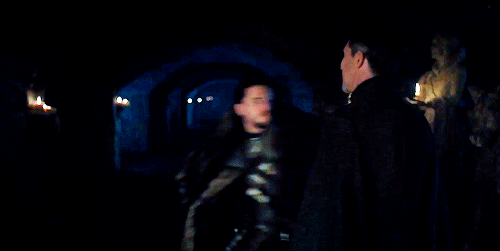
Thanks for your message.
99 notes
·
View notes
Text
Lilith’s Curses- The Crane Wives
I really feel like Curses by The Crane Wives just… FITS Lilith perfectly as a song- Specifically a song from Lilith’s perspective, how she feels about Eda, her own guilt over the curse, the moral dilemma she’s facing, and the loneliness that Lilith feels. Looking at the lyrics;
There’s a fire in my brain and I’m burning up
Oh my, oh my
Keep running for the sink but the well is dry
Oh my, oh my
Every word I say is kindling
But the smoke clears when you’re around
Won’t you stay with me, my darling
When my walls start burning down?
I’ve talked before about how Lilith has a bit of a Fire motif going on, and how Fire seems to be related to the Emperor’s Coven, as well as characters who want to join it (Amity) or subscribe to the same ideas of hierarchy and power (Boscha). Belos’ own throne room is lit up by burning braziers… And we see Lilith with spells that cast blue fire. And, I think this motif is symbolic of just how destructive these characters can be, both towards themselves and others- And how Lilith is someone who no doubt felt a lot of immense pain over cursing Eda, over her one-time mistake as a child that spiraled far beyond anything she could’ve expected.
Lilith is hurting herself by joining the Emperor’s Coven, indoctrinating herself into its toxic beliefs and cult-like mentalities… And she hurts others; Such as wild witches, Eda, Luz… And there is that horrible implication that some wild witches are burned at the stake as execution, given that one poster in the library, as well as the giant furnace in Belos’ castle. Not only that, but ‘Fire in my BRAIN’ specifically? I think this can apply to how Amity tried to burn Willow’s memories, so they both could get forget and pretend the past never happened… And I think this could create the image of Lilith willingly burning away her own memories just to cope, and/or how she damaged Eda’s memories with the curse. Lilith, like Amity, set a fire that hurt someone’s mind- But it’s Lilith herself who is the victim, it’s Lilith who tries to blind herself and ignore the corruption of the Emperor’s Coven, and hopes that Eda can one day join her.
You have Lilith ‘running for the sink’ but the ‘well is dry’, because she doesn’t know how to cope, she definitely can’t in a toxic environment like the Emperor’s Coven. Every word she says is kindling- The propaganda she preaches just buries Lilith further into her sins, each lie uttered by her about the curse just contributes to the unnecessary pain… And every word that Lilith says during her confrontation with Eda in Agony of a Witch, culminating to her specific confession of the curse? One might say it nearly burned the bridge between her and Eda…
But the smoke clears when Eda is around- Because then Lilith remembers, Lilith finds comfort, she can go back to those old days when they were happy together and not in this kind of pain. One could also interpret the smoke clearing, because Eda combats the Emperor’s Coven and its fire motif- I’ve talked about Eda having a Wind motif, and we know that wind can blow away smoke… Of course, even when Belos is ‘burning down’ the Boiling Isles, Lilith asks for Eda to be with her, at any cost- Even when the walls are burning down, even if being in the Emperor’s Coven is going to hurt Edalyn in the long run; Because Lilith wants her sister back so desperately that she might just hurt her, as we see when she willingly depletes Eda’s magic to capture her.
Obviously Lilith believed that it’d all come back as soon as Belos cured the curse- But there’s the idea of Lilith being possessive of Eda, wanting her sister by her side at all times… Downplaying Eda’s connections with other people, with Lilith finally taking the step to disregard Eda’s freedom when Belos threatens her. Lilith traps Eda with her, in a bubble, in the Emperor’s Coven- Inside a throne room with two massive, burning braziers… And Lilith’s walls are burning down because her world-view is collapsing around her, Belos is threatening to execute her, Eda is fighting her, her belief in the Coven System is being shattered.
She just desperately needs Eda’s guidance throughout this process, even if it’s at Eda’s expense. Lilith wants Eda to help and provide for her, but… She’s not quite ready to give Eda what her little sister truly deserves, either- Lilith’s offered some support by bending the law, but she needs to give true unconditional love and support, by siding with Eda openly against the Emperor’s Coven. Lilith wants Eda’s validation- But she still has plenty to give to her own sister. In the season finale, we even get the two being executed together; Had Lilith not acted to capture Eda, it would’ve been JUST her… But thankfully Luz saves them all in the end.
Still, there’s that recurring theme of Lilith being toxic to Eda, dragging her down, inhibiting Eda’s freedom and expression of self by bringing her sister down with her, just for Lilith’s selfish sake and comfort. Lilith asks Eda to stay with her, even as her walls come burning down… Just as Lilith’s spell-barrier is breaking apart, and her ‘walls’ come down as she opens up, and reveals the truth about the curse, about how she’s been feeling, as her mature and innocent façade falls apart. And when the truth and who Lilith really is, is laid bare to Eda- Lilith tries to negotiate, in essence desperately begging Eda to still love her sister and be with her, and to stay with Lilith even after her guilt is unveiled, all in the midst of Lilith using Luz as a hostage.
This house is my name like an elegy
Oh my, oh my
Echoing where my ghosts all used to be
Oh my, oh my
There’s still cobwebs in the corners
And the backyard’s full of bones
Won’t you stay with me, my darling
When this house don’t feel like home?
When this house don’t feel like home?
We don’t know where Lilith lives- But we did see concept art of Lilith’s room, and the window implies it could be within Belos’ castle. Belos’ castle, Lilith’s old childhood home where she cursed Eda- Both work here as places that no doubt feel largely empty and haunted to Lilith for a number of reasons… Her old home because it’s where her happiness and childhood both thrived and died, where the young Lilith we saw disappeared and was replaced by the dark-haired one without glasses; And Belos’ Castle, because of how cold and cut-off it is, how isolated and lonely Lilith feels within the massive, empty architecture. Regardless of where she lives, Lilith doesn’t feel like she’s at home, because home is where you feel safe, where you feel like you belong…
That’s the importance of the Owl House, as a location that provides belonging and comfort, and the freedom to be oneself- A TRUE family… The Emperor’s Coven is no family for Lilith and she knows it, so she asks Eda to come over and MAKE it that way… She wants Eda to be with her ‘real’ family, or make that family for her real. And that’s what Lilith tries to do, ascending the ranks, looking up to Belos- But Belos doesn’t care, he just sees her as another tool. Lilith also mentions an ‘elegy’, she’s mourning her past self and how it ‘died’, she’s lamenting her lost connection with Eda, and the Eda she loved- Acting like she’s dead, when in reality she still lives on in spite of the curse… And this was who Eda always was.
Perhaps Lilith’s ideal image of Eda was shattered, who knows? Lilith misses the young Eda, the simpler one that wasn’t cursed and wasn’t defying the Coven System, and she mourns for her like she died… Eda still lives, Lilith just wishes she was different, that she’d be like she used to be, because then they could be in the Emperor’s Coven together like they dreamed- Lilith wants Belos to ‘resurrect’ the Eda she missed. And Lilith- Lilith might mourn her old, innocent childhood self as well. She certainly doesn’t look like her anymore… The backyard’s full of bones- Lilith’s skeletons in the closet, as well as the fact that Belos’ castle likely has a LOT of people dead or dying in it thanks to his executions.
Oh ashes, ashes, dust to dust
The devil’s after both of us
Last my curses out to rest
Make a mercy out of me
Lilith has been burning the bridge between her and Eda to ash, and she wishes she hasn’t- But she’s too scared to defy the Emperor’s Coven, and she doesn’t fully understand Eda’s reasoning, even if deep-down she kind of wants to. The ‘Devil’ is of course Belos, hunting down wild witches or recruiting them into his coven- He’s horned, monstrous, and burns people. The devil could also be retribution for one’s sins, and boy does Lilith have plenty! And she sees Eda as having a few due to being a ‘criminal’. We also have Lilith, who just wants to lay her guilt to rest, lay the curse to rest by killing it with Belos’ help… She just wants mercy from others, from herself and Eda through forgiveness. She wants mercy from life, Lilith wants to finally be freed from the curse, but she never will be…
She can never rest, there’s even more work to do now that she’s changed her heart and needs to make things right. Though because Lilith is no longer focusing on just the curse as of the finale, and has finally shared it with Eda- Perhaps that issue has finally been put to rest, at least for now, so Lily can repair her relationship with Eda. Lilith confessed and now the secret is gone… And Lilith gets mercy from Eda, who tries to strike down her sister at the Conformatorium, until King vouches for Lilith’s defense. Lilith also wanted mercy from Belos, wanted him to be forgiving of her mistakes- But she finds the only person she can get this from is someone who DOES love her, Eda.
This tired old machine is a-rumbling
Oh my, oh my
Singing songs to the secrets behind my eye
Oh my, oh my
All my aching bones are trembling
And I may yet fall apart
Won’t you stay with me, my darling
When the war starts in my heart?
When the war starts in my heart?
Lilith is tired, she’s getting older now and wasted so much of her life in the Emperor’s Coven, and trying to cure the curse. She’s tired of the guilt, tired of the work, etc. The Emperor’s Coven reduces individuals to mindless, robotic followers… And Lilith is beginning to break at the seams and give away, she can’t handle this anymore. She’s too lonely, and Lilith knows that she and Eda are running out of time in a lot of ways- In regards to their lifespan, Belos’ patience, their time before the curse takes over, their time before it’s too late to fix things between them…
Lilith is about to have an emotional breakdown, and then she finally does- That’s why she confesses to cursing Eda during their duel. The mask is breaking and who Lilith is, how she really feels, lonely and guilty and afraid, uncertain, it’s coming out… Lilith’s got secrets behind her eye, all right; The knowledge of the curse, and now that secret IS on her eye, as of the season finale. And that happened because of a verbal spell that rhymes, the way a song might…
Even after it’s revealed, Lilith still wants Eda to be with her; She NEEDS Eda to be with her, to help Lilith settle the conflict in her heart, as she’s torn between loving Eda, feeling resentment… Wanting to join the Emperor’s Coven, wanting to be with her sister; Knowing deep-down that the Emperor’s Coven is corrupt, but being too afraid to defy it openly… Hating herself but paradoxically buying into the propaganda that she’s superior to others.
Lilith is having a crisis on what to do/believe, she’s a walking contradiction pulled between two options, and she needs Eda as comfort- Either to encourage Lilith to side with Eda, or to have Eda go with her to the Emperor’s Coven. Lilith needs to be told what to do, because her life in the Emperor’s Coven taught her not to think for herself, she cursed Eda not because of her own judgment but because she thought it was what Belos would do. In the end, the decision ultimately boils down to just Lilith, as all of the effort in the world to change someone’s mind won’t do a thing, if they don’t wantto change.
Lilith has to choose between what she really loves, wants, and values in life- She has to choose between the Coven System and Eda. And Lilith desperately wants Eda to recognize that she’s having a crisis herself, that she’s not as perfect as she claims, that Lilith too is struggling… Lilith wants Eda to acknowledge this, that Lilith IS working and trying to make things better between the two of them, and why can’t Eda just acknowledge and appreciate this?
That’s why we have our last new line from this song, with the rest being repeated lyrics; “Tell me I am good enough”. Lilith has struggled with not being good enough for the Emperor’s Coven, not good enough for Belos… Not good enough for Eda, not as strong as her… Not as independent and brave, and Lilith feels like Eda is judging her for this, with Eda apparently thinks she’s always been better. Lilith wants, she desperately NEEDS and craves validation- To be told she’s good enough, just like her apprentice Amity.
She’s tired of feeling undervalued, of feeling terrible and inferior, insignificant, that she always makes mistakes- She just wants someone to tell her for once that she did what she could, that Lilith tried her best, and it’s enough! Lilith wants someone to ignore her shortcomings and say she’s perfect and has nothing to improve on, that for once she DID make the right decision and has nothing to apologize for, hence why she’s stubborn about acknowledging how kidnapping Luz was unjustified because it’s for and Eda’s sakes. Lilith wants to be told that her victories against Eda were real and valid, and not the result of cowardly tactics and Eda not even giving it her all… Lilith wants to believe she’s good enough to be by Eda’s side, maybe even better- Or good enough to cure the curse, to have her efforts at least appreciated by Eda.
But at the same time, Lilith wants someone to tell her that she never needed to ‘prove herself’, not by joining the Emperor’s Coven or anything else- And that this reassurance can help her leave and finally reconnect with Eda. If only Lilith had been told she was good enough, she never would’ve tried to take Eda’s spot in the Emperor’s Coven away from her… Lilith’s insecurity and feelings of inferiority are at the root of all of her flaws and mistakes in life, and if she can be told that she’s good enough, just this once, or that she feasibly CAN be at least- Then maybe she can finally make things right.
And now, as of the finale- Lilith wants someone to tell her that she’s good enough, that her efforts have been recognized, that either she’s earned love, or has always been worthy of it- Lilith wants to be reassured that she deserves love and can even get it in the first place. She wants to be told that she doesn’t have to earn anything, after feeling like she’s had to work for everything in her life, Lilith is already entitled and due just for existing.
And, at the Owl House… I really think she will get that kind of validation, and finally be able to heal as a result. Lilith can learn to agree with Eda that nobody has to prove they’re worth of dignity, respect, and love- Everybody is, that’s a right you really have to work to forfeit by being cruel to others. Lilith wants to be absolved of the guilt and blame in ways that aren’t productive, such as ignoring her own flaws… And ways that ARE, by recognizing that the Coven System has genuinely hurt and indoctrinated her, and failed to provide in ways it promised.
#the owl house#toh#the owl house lilith#lilith clawthorne#the crane wives#the owl house eda#edalyn clawthorne#toh lilith#meta
36 notes
·
View notes
Text
Notes for “Rural Boys Watch the Apocalypse”
“Your hand’s in mine”
This poem doesn’t explicitly state the relationship between the two boys, and this adds to it. The two characters could be in a romantic relationship, and this choice comes with a variety of implications given the traditional christian liturgy that’s repeated throughout the poem. If this is the end of the world, where will these two gay boys end up? Are they thinking about their afterlife? Are they wondering if they can stay together? Whether they’ll be with their family? There’s so many questions that these boys might be thinking of if they’re in this sort of relationship. They could also just be very close neighbors. Later in the poem he specifies his “doomsday neighbors,” which might be a sign that the other boy and his family might be the other neighbors, or it might have just been explaining the neighbor’s behavior. Another option could be that they’re best friends that are so comfortable with each other that holding hands feels comforting, but not completely natural because the narrator thought it was important to point it out.
“waters turnin' to blood”
The two boys obviously share the same or similar religious views, and are probably at least somewhat learned or devout in their faith. I grew up reading the scriptures and I can’t say off the top of my head what a biblical apocalypse looks like - but this boy can, and relates it to the other boy, expecting him to also understand.
“But there are only the fallin’ stars”
I’m struck that the “only” thing is the falling stars. It’s almost as if he’s saying that the rest of the world has already ended, already vanished from his view and his mind. All he can see is the stars falling, and it doesn’t matter anymore if the rest of the world or the people around him still exist. He’s somehow writing himself and the other boy off as unimportant in the face of this global catastrophe. This line also stands outside of any stanza, forcing us to pay attention to the entire phrase and inviting a degree of separation from the stanzas before and after. There are only the falling stars, and that’s important. More important than what this boy thought would happen, more important than telling where the initial warning came from. The present events hold more weight.
"'Least the weather channel warned us about it,"
I wonder why the weather channel is the one that predicted this apocalypse? He mentions falling stars, which might be under their jurisdiction, but I feel like higher-up governmental agencies would be in charge of announcing and predicting the literal end of the world.
“are loadin' the back”
If the stars are falling, and this is the end of the world, where do these neighbors think they’re going? Where do they think that they’ll be safe?
“under large whitewashed crosses”
This line is especially striking given the religious imagery throughout the entire poem. Jesus was a middle eastern Jewish man, and that’s something that many Christians in America conveniently forget. Many people in this religion spread around views that those with darker skin are children of ham (as we see in the Poisonwood Bible) or suggest that the native american people are really the descendants of the Lamanites, so their darker skin was a curse from God. These crosses that the neighbors are taking with them embody all of these harmful beliefs. The religion itself is whitewashed. The crosses are described as large, and I’m having trouble modulating that size within my own thoughts. On one hand, they have to be small enough to fit within the back of a pickup truck. But, are these crosses large as in “human sized and could be used for their original purpose”? Large as in “larger than handheld so they seem giant, but they’re best suited for yard decorations”? Either way, I’m taking it as a symbol of how contemporary christians take up the most space in religious discussions in America and quite often interpret anything different from their blatantly obvious beliefs as an attack on their faith. Think Boomers yelling about the “war on christmas” type. These crosses are not only whitewashed but they’re large too, visibly screaming to anyone looking in their direction that the drivers of the truck belong to the Christian faith and that they’re going to be confrontational about it. Everything else is stacked under the crosses, giving them the most significance and the most visibility.
“I wanna see ‘em”
Honestly, this line slightly confused me. These women seem quite knowledgeable about the events foretold in the bible. But it’s also stated in the bible that human beings never see angels or God’s true form because we wouldn’t be able to handle it. Surely they must know that? Do they think that these rules will be lifted simply because the world is ending? Are they hoping to see these wonders even though it would have untold consequences on her own mortal form? Don’t get me wrong, I would also love to see an angel in their full and confusing glory, but I don’t have enough of a death wish to actually follow through with that.
“their calloused hands”
Interesting imagery here. Typically angels are described using delicate and ethereal words, or sometimes words that just remind us that angels are spirits and don’t have physical bodies. But the word “calloused.” Calluses imply hard work. Calluses mean rough hands, dirty feet, and tough love. Calluses mean a physical body that is growing stronger. There’s nothing delicate about calluses. There’s nothing inherently holy about calluses. The working class has calluses, and the so-called “perfect” bodies of models and influencersnever have calluses. But here these heavenly beings are, rough hands and all. Perhaps he’s envisioning someone he knows as an angel, and thus opted for the more human-feeling approach. Perhaps he’s hoping that the people of earth are fighting to stay here, fighting to continue living, and the mere act of carrying these writhing and fiery people causes so much work for the angels that they develop these human characteristics of calluses. Perhaps he’s hoping that he’ll become an angel over some darker fate. I’m not sure what implications were intended with this line, but it feels beautiful and wholly human to me, and I love it for that.
“stupid damn harp”
This is the first of two instances where the narrator uses the phrase “stupid dumb” to describe something of the archangel Gabriel’s. Both times he isn’t describing Gabriel himself, just things that he possesses in traditional stories. This could be a nervous boy making jokes in an unsure time as a coping mechanism, but it also could be the author showing his own disillusionment with the traditional christian stories and traditions.
Additionally, the combination of “stupid” and “damn” here is pretty interesting. In Christian mythology, any deity in heaven (e.g. God, angels, Jesus, etc) possesses all the knowledge in the universe. This boy referring to the archangel’s belongings as “stupid” doesn’t reflect this. It almost feels like he wants to criticize the angel himself but he knows there might be consequences, so he settles for calling his iconic harp and tunic the words he wants to call the angel himself. He’s also using the word “damn,” which in biblical contexts typically has hellish connotations. If someone is damned, then they’ve been condemned to hell. The archangel Gabriel is the literal antithesis of that idea, so it’s interesting to see this word applied to anything involving him at all.
“moanin’ like a sinner in hell”
This comparison continues the interesting dichotomy between heaven/hell that we find throughout the poem. The doomsday neighbors’ truck not only holds large whitewashed crosses, but also sounds like someone suffering in hell. Weirdly enough, it seems to give us a view at the sort of Christians that think they’re doing God’s work (holding the whitewashed crosses), but once they get started towards their destination, it becomes more and more obvious that they’re not being entirely truthful (sounding like a sinner in hell).
I’m also struck by the mildness and neutrality in this sentence. Usually when someone’s talking about those in hell, the verb used is “screaming,” not “moaning.” Is this wishful thinking on the narrator’s part, or just a description of the truck’s engine using terminology he already knows? The narrator doesn’t seem to be passing judgement with this comparison either, it comes across as an observation rather than a condemnation of the neighbors’ actions. His family chose not to leave, their family is leaving right now, and those two actions aren’t compared or judged here.
*
This poem was chosen for the anthology because of the twisted biblical themes tempered by a slight homoerotic vibe. From the beginning of the Abrahamic religions to today, LGBt+ individuals have been left out of religious contexts at best and damned to hell at worst. Given the author’s experience as a gay trans man, I’m reading the narrator and the other “rural boy” as lovers. The poem contains many instances where the narrator invokes sacred and profane imagery in reference to the same objects or beings, and gives a new sort of “hot take’ on the biblical apocalypse - contributing perfectly to the theme of altered religion.
*
Bibliographical Information:
This poem was posted on Tumblr, and the original source is reblogged below.
10 notes
·
View notes
Photo
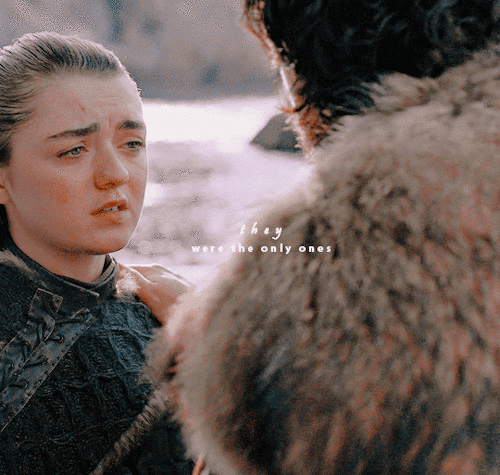
Jon’s Love for Arya and Sansa are not the same
@sweetlingsansa
Your recent Jon x Love post gave me a chuckle. You appear quite confused in how Jon feels about the two Stark sisters. I’m going to address the way you chose to highlight this point: I sense you’re obviously projecting the feelings he has for one sister that George goes to great lengths to show his readers. In fact, George was specifically asked that question and his answer couldn’t be more clear:
On Jon/Arya:
Granny: Are you trying to say something to the reader by drilling into us how much Arya and Jon love each other?
George_RR_Martin: “Say something to the reader?” I’m just reporting how the characters feel. Of course, everything in the book says something to the reader.
Yet @sweetlingsansa reduces Jon’s feelings for Arya as simple family affection. Sigh. What books did you read? Very suspect. Then you falsely claim Jon apparently feels PURE, PERFECT, UNCONDITIONAL love (where?! lol) for the sister he barely spares a second, third or forth thought on? The sister he can go without seeing again if it meant he could have the other more important people back in his life. The sister that only thought about him when he was the last family she had left.
The sister Jon didn’t spare a thought for over her plight in King’s Landing surrounded by enemies. YET multiple times, he wonders how Arya is… even though deep down he knows she must be dead.
Only one sister was worth breaking his vows for. It was only one sister that occupied his last thought before he died. His dearest wishes involved her.
When Jon wakes from this “death” like Beric described and Lady Stoneheart is demonstrating, the last things that were most important to the undead person at the end of their life will be their fixation when they rise again. Lady Stoneheart’s search for Arya and killing Freys & Lannisters. Revenge. With Jon, he died with a mission he pledged himself to in riding south to Winterfell to face Ramsay Bolton and get Arya back.
“… I want my bride back … I want my bride back … I want my bride back …” was the last thing Jon considers before he decides to break his vows.
“I have my swords, thought Jon Snow, and we are coming for you, Bastard.”
Jon’s death scene in ADWD was significant. His last word was Ghost, his last feeling was pain, and his last thoughts were about a girl he loved more than anything:
Jon fell to his knees. He found the dagger’s hilt and wrenched it free. In the cold night air the wound was smoking. “Ghost,” he whispered. Pain washed over him. Stick them with the pointy end. When the third dagger took him between the shoulder blades, he gave a grunt and fell face-first into the snow. He never felt the fourth knife. Only the cold. - Jon, ADWD
“Jon will want me, even if no one else does.” (Unconditional) - Arya
George is just reporting how the characters feel remember:
The memory of her laughter warmed him on the long ride north.
~*~
And Arya … he missed her even more than Robb, so fierce and willful. she could always make Jon smile. He would give anything to be with her now...
~*~
He remembered the day he had left Winterfell, all the bittersweet farewells; Bran lying broken, Robb with snow in his hair, Arya raining kisses on him after he’d given her Needle.
~*~
That might mean Lord Eddard would return to Winterfell, and his sisters as well. He might even be allowed to visit them, with Lord Mormont’s permission. It would be good to see Arya’s grin again and to talk with his father.
(These two last quotes above are striking in their exclusion of one sister. Yikes.)
~*~
He remembered suddenly how he used to muss Arya’s hair. His little stick of a sister. He wondered how she was faring. It made him a little sad to think that he might never muss her hair again.
This is from Book 2. He thinks she is still alive? When everyone else thinks she’s dead.
~*~
Jon had never met anyone so stubborn, except maybe for his little sister Arya. Is she still my sister? he wondered. Was she ever?
This is just so major, the implications. Wow.
~*~
“He’s to marry Arya Stark. My little sister.” Jon could almost see her in that moment, long-faced and gawky, all knobby knees and sharp elbows, with her dirty face and tangled hair. They would wash the one and comb the other, he did not doubt, but he could not imagine Arya in a wedding gown, nor Ramsay Bolton’s bed. No matter how afraid she is, she will not show it. If he tries to lay a hand on her, she’ll fight him.
~*~
By now she’d be eleven, Jon thought. Still a child. “I have no sister. Only brothers. Only you.” Lady Catelyn would have rejoiced to hear those words, he knew. That did not make them easier to say. His fingers closed around the parchment. Would that they could crush Ramsay Bolton’s throat as easily.
~*~
His thoughts kept returning to Arya. There is no way I can help her. I put all kin aside when I said my words. If one of my men told me his sister was in peril, I would tell him that was no concern of his. Once a man had said the words his blood was black. Black as a bastard’s heart. He’d had Mikken make a sword for Arya once, a bravo’s blade, made small to fit her hand. Needle. He wondered if she still had it. Stick them with the pointy end, he’d told her, but if she tried to stick the Bastard, it could mean her life.
~*~
“I have no sister.” The words were knives. What do you know of my heart, priestess? What do you know of my sister?
I love winning.
~*~
Melisandre seemed amused. “What is her name, this little sister that you do not have?”
“Arya.” His voice was hoarse. “My half-sister, truly …”
~*~
Gods of my fathers, protect these men. And Arya too, my little sister, wherever she might be. I pray you, let Mance find her and bring her safe to me.
~*~
He glanced at the letter again. I will save your sister if I can. A surprisingly tender sentiment from Stannis, though undercut by that final, brutal if I can and the addendum and find a better match for her than Ramsay Snow. But what if Arya was not there to be saved? What if Lady Melisandre’s flames had told it true? Could his sister truly have escaped such captors? How would she do that? Arya was always quick and clever, but in the end she’s just a little girl, and Roose Bolton is not the sort who would be careless with a prize of such great worth.
He keeps hitting that right spot. Jon the president of the Arya Stark stanclub from day mf 1.
~*~
What if Bolton never had his sister? This wedding could well be just some ruse to lure Stannis into a trap. A grey girl on a dying horse, fleeing from her marriage. On the strength of those words he had loosed Mance Rayder and six spearwives on the north. He had even less trust in Melisandre. Yet somehow here he was, pinning his hopes on them. All to save my sister. But the men of the Night’s Watch have no sisters.
~*~
And keep him away from the red woman. She knows who he is. She sees things in her fires.”
Arya, he thought, hoping it was so.
~*~
“That’s good.” Jon felt fifteen years old again. Little sister. He rose and donned his cloak.
~*~
He wanted to believe it would be Arya. He wanted to see her face again, to smile at her and muss her hair, to tell her she was safe.
~*~
The girl smiled in a way that reminded Jon so much of his little sister that it almost broke his heart.
~*~
The girl smiled in a way that reminded Jon so much of his little sister that it almost broke his heart. “Let him be scared of me.” The snowflakes were melting on her cheeks, but her hair was wrapped in a swirl of lace that Satin had found somewhere, and the snow had begun to collect there, giving her a frosty crown. Her cheeks were flushed and red, and her eyes sparkled.
“Winter’s lady.” Jon squeezed her hand.
~*~
He wondered where Mance was now. Did he ever find you, little sister? Or were you just a ploy he used so I would set him free?
~*~
It had been so long since he had last seen Arya. What would she look like now? Would he even know her? Would she still have that little sword he’d had Mikken forge for her? Stick them with the pointy end, he’d told her. Wisdom for her wedding night if half of what he heard of Ramsay Snow was true.
Sill worrying about Arya’s wedding night. Wow.
~*~
Bring her home, Mance. I saved your son from Melisandre, and now I am about to save four thousand of your free folk. You owe me this one little girl.
~*~
You know nothing, Jon Snow. He thought of Arya, her hair as tangled as a bird’s nest. I made him a warm cloak from the skins of the six whores who came with him to Winterfell … I want my bride back … I want my bride back … I want my bride back …
These aren’t even ALL the Jon/Arya quotes from the books, no conjecture, tortured symbolism, imaginary themes/loose connections/extrapolations or weak nonsense explanations, just direct quotes.
Direct. quotes.said.by/about.two.people. Something most Jonsas have very little experience with I know. The Arya quotes would fill pages.
This wasn’t done by accident. George didn’t do this for fun.
These two matter to eachother on a level you don’t seem to understand or want to acknowledge.
#jon snow#Arya Stark#Sansa Stark#house stark#jon x arya#Jon x Sansa#jonrya#jonsa#anti jonsa#asoaif#game of thrones#grrmartin#winterfell#winds of winter#greek mythology
209 notes
·
View notes